#what part of any of this says Izzy was a father figure or that Izzy had any power in their dynamic??
Explore tagged Tumblr posts
Text
sorry to get on my father figure soap box again but the clearest way we know that even DJenks himself doesn’t believe Izzy is Ed’s father figure is that Ed never for a single moment behaved towards Izzy like he did towards Pop Pop
#like fucking hell y’all#we can see Ed fawning so fucking hard to Pop Pop to get his approval and trying to earn his kindness#he never had to earn anything from Izzy because Izzy was always his inferior officer#besides the fact that he asked izzy to be his first mate AFTER he was *already* ‘the legendary blackbeard’#and ed told Izzy he had to be loyal to him when Ed asked him to fulfil that role like??#what part of any of this says Izzy was a father figure or that Izzy had any power in their dynamic??#make it make sense#izzy hands#the izcourse#ofmd critical#david jenkins critical#our flag means death#ofmd#fandom wank
139 notes
·
View notes
Text
Izzy Discourse Masterpost
Hey all, given the amount of awful splintering and wank happening in ofmd fandom rn regarding Izzy's death, including the flat-out immature and unacceptable harassment of David Jenkins and Co, I wanted to just make this one all-encompassing post to address the various grievances and complaints I've seen (almost entirely on Twitter). If I've missed anything, please feel free to add on. I'm putting most of this under a read-more for length.
Please be aware, I say all of this as an Izzy fan. I've loved his character since season 1, and while I was sad to see him go, I completely understand and support David & Co's reasons for concluding his arc, and I think it was done respectfully in a way fitting to his character. So let's break down some of the takes I've seen. I am not referencing specific posts or people here, I just want to address the general themes that I keep seeing about why some people are upset.
Izzy's death served no narrative purpose.
Look, this is one that I'm sure fans will debate for the rest of the hiatus. It's completely within your right to disagree with this writing choice, but Izzy's death did serve a narrative purpose in the story that David Jenkins is telling - and he has spoken to this end in several interviews already. I can only summarize here, and fans may find other perspectives in time as well. What we need to remember is that Our Flag Means Death is, at the end of the day, Ed and Stede's love story. That has been made abundantly, explicitly clear. The show has been fantastic at fleshing out the other supporting characters, but that's what they are - supporting characters. They often have their own subplots but ultimately the narrative seeks to move Ed and Stede's story forward and they are tools to spur Ed and Stede's growth or mirror their struggles. Izzy has been a wonderfully complex, multifaceted character but we must remember that all characters are vessels through which stories are told, lessons are imparted, and metaphors are established. He's not a real person who 'deserves' any particular fate. David said he's always intended for Izzy to die at the end of his arc.
Firstly, Izzy (now canonically, through his own dying words) represents part of Blackbeard. He enabled and encouraged Ed's darker side, they were mutually toxic forces to each other. Ed is attempting to cope with and move on from this phase of his life, and like Stede in season 1, set out a free man, unshackled by expectations and loose ends of those he's hurt and been hurt by (though we realize this is an ongoing process that takes time). This lovely gifset sums it up nicely, with Izzy being the Mary parallel, and making s2 mirror s1. Blackbeard is both Ed and Izzy; Ed cannot be free of Blackbeard while Izzy is in his life, and when Izzy is gone he will never truly be Blackbeard again. They are each other's rotting leg!! Yet, they love each other - and David has said that for Ed, this has developed into a mentor and father relationship, and where Ed has previously despised his father figures (his actual father, Hornigold) he does not want to lose Izzy. This time, Izzy brings out Ed, not Blackbeard - and that's where we get the callback to 'there he is', bringing their impact on each other full circle, freeing Ed, getting approval of sorts that he never had, to be soft, to be loved (and there are parallels to Zheng and Auntie here as well that others have made) from that force that drove him to stay in line all this time. David has said in multiple interviews now that he was going for the idea of the mentor/father figure dying and the hero living on and trying to do justice to them.
From Izzy's side, Izzy cannot be free while Edward remains either (Mary cannot find peace while Stede remains). The scar never truly healed, the leg will always be a reminder. At this point the argument becomes 'yes, but why did he have to die? Why not just sail off with the crew of the Revenge?' David has stated that he feels they've done everything they can with, and for, Izzy; he's come leagues from season 1, he's found community, he's found hope, he's found new parts of himself, and he's made good memories. He's found worth outside of what he can be to others. That's more than most pirates could hope for. Where would his character go from there, when the Golden Age of Piracy he belongs to has burned to the ground? Would he stay around and whittle on the Revenge? If he were a real person, yes, that would be lovely, and he'd deserve all the quiet peaceful happiness in the world. But as I explain several points below, he's not interested in being a captain. He's not up for the hard physical labor of regular crew, and he's extremely overqualified for that besides. He has served his narrative purpose, and symbolically, to enter a new age, everything must go. He's connected to the old age of piracy, to the Republic of Pirates, that is now demolished. To him, fighting for what he believes in, for the family he's found, bringing down an army of British twats in the process, is how he should go. It's a pirate's death, and as Izzy's said, he's a pirate - unlike Blackbeard who's succeeding in breaking away from piracy, Izzy never wanted to stop being a pirate, throughout his arc. To me, that's why Izzy remains trapped in the narrative, trapped in history, whereas Ed and Stede will escape history. They leave piracy, and canon, behind, while Izzy was content to remain a pirate and face a pirate's fate.
Burying him on land, right next to Ed and Stede's beach house, shows that his sacrifice was not in vain - they start this new life together, thanks to Izzy's mentorship, his role in their lives that sometimes for worse, sometimes for better, made their love what it was and made their breakaway possible. The new age is built on the foundations of the old age, and is stronger for it.
As we're well aware by now, David tweeted that there's no version of ofmd without Izzy. Whether that's literal or not, symbolically it's true. Izzy's arc of growth affected everyone on the Revenge. Jim fondly remembered fighting for a time when life meant something on that ship; the crew helped give Izzy new meaning in life, and he helped them in return. When he dies, they mourn and have a funeral; that wouldn't have happened under Blackbeard's watch in episode 2. His life meant something to them. He influenced Ed and Stede immensely, and they will take that with them. As David's said, they're all a family, and Izzy was a part of that family, and his loss unites them and brings them closer to continue to fight for that family they've built. It's a tragic, sudden death of someone they've all grown to care for, and that steels their reserve to keep the torch lit. They literally sail off into the sunset to hunt down Ricky to avenge Izzy; he will always be a part of this show. And, of course, with the brief appearance of seagull Buttons, the door is left open for anything.
If this was The Izzy Show, then sure, we'd be content to see him simply engaged in shenanigans every episode. But the plot, and therefore the characters, need to keep moving forward, and Izzy got his growth and development. He got what he needed for his character to have closure, and he served his symbolic narrative purpose in Ed's (and Stede's) story. You may have your own ideas and perspectives, and that's great - that's what fandom is for. But we cannot say his death was pointless when David Jenkins and the writers clearly had a well-defined motive for pushing the narrative in this direction. I actually think the narrative around Ed and Izzy is the most well-developed in the entire show. I for one am so happy we got such an interesting and complex character, and had the brilliant Con O'Neill to portray him.
Izzy's growth & healing arc was rendered pointless by his death.
As this post so eloquently puts it, it's pretty bleak to have the outlook that taking steps to heal and find meaning in life is worthless if it's later lost. Seeking happiness and self-actualization is worthwhile for its own sake; no one knows what's down the road, and we all die eventually. Find meaning in life now. Would you rather have had Izzy not miss with his bullet in ep2? He was given the chance to experience joy, freedom, and hope for the first time in potentially a long time, and when he died he did so with those happy memories. As mentioned, Izzy's death was decided long beforehand given the narrative, and the point of storytelling is to make you feel emotions. We were given impetus to connect and relate to Izzy's character through his process of healing, so when he did die, we felt it keenly. That's how stories work actually! We felt what Ed felt. It moved us. It's not a bad thing that Izzy's arc made him more likeable to fans before his death. It's not a bad thing to lose a beloved character - guess what, it happens constantly in stories - and it's not bad to grieve over it either, but to say that it made his journey pointless is just not true. People saying that Con must be upset that they snatched his character away from him after getting to develop him so much - again I say, would you rather him have died in ep 2 before he had the chance to grow? Or how about in s1, when the crew tried to mutiny? How'd you feel when Stede killed him in his dream, in the very first scene of the season? I think Con's probably glad for the opportunity to have explored this character so much in season 2. Ask him if he thinks it was pointless.
Killing off Izzy was bad for queer rep/burying your gays/"Izzy was the queer heart of the show"
I'm putting 'bury your gays' on the top shelf so people can't use it when it doesn't actually apply. Most of the main cast of characters in this show are queer, and it's a show about pirates with a good amount of violence. Ergo, chances are a queer character will die in the course of Things Happening In Stories. Izzy didn't die because he was queer, and he wasn't the token queer rep. Please turn your attention to the boatloads (literally) of queer characters that are happy and thriving (how about the LuPete wedding immediately afterwards??). As for Izzy being the "queer heart of the show," this is literally the Ed and Stede show. You know, the two queer leads whose queer love the show revolves around, per David Jenkins himself. I'm glad folks connected with and derived joy from Izzy's growth and especially his performance in Calypso's birthday, but he is not the main character of the show. The queer heart of the show is in fact, the entire show, all of their characters and the community & found family they create aboard the Revenge. Not to mention the fan community as well. Izzy was never carrying the show's representation on his back, and frankly that's an absurdly wild take to have (esp when he spent most of s1 actively working against the main queer relationships in the show, attempting to maintain the oppressive status quo of pirate society).
It was bad and irresponsible to have a suicidal character die
Are we forgetting the entire first half of the season where Ed, who was suicidal, kept trying to passively kill himself because he felt he was an unlovable monster, only to be shown that he is in fact loved unconditionally and it gives him the strength to fight for life and triumph against his own self-doubt? The show has spent quite a lot of effort telling viewers that despite feeling damaged or broken you are worthy of love and that you are loved even if it may be hard to see it when you're in a bad place. That you don't need to be fully healed to deserve love and care, and that love and support will help you along your journey. It's incredibly wild to disregard this major plot point and fundamental message of s2 to try and spin this the opposite way for Izzy's character.
Secondly, where are people getting 'Izzy is suicidal' from? Are we going back all the way to episode 2, when he's at his lowest point and fails at his suicide attempt, only to be figuratively reborn after removing the metaphorical rotten leg? By the time of the finale he's shown to be in a good place, thanks to the arc of healing and growth he's gotten, through the support of the Revenge crew and his 'breakup' with Blackbeard allowing him to find his own way in life, realizing he doesn't need a purpose to have value and enjoying his time on the Revenge and the bonds he's made with Stede and the crew. He is, in the words of Ivan, "the most open and available I've ever seen him" by the finale. To take episode 2 as evidence he's suicidal is to erase his whole season of growth, which is an ironic thing to do in the context of these arguments. There's no canon evidence Izzy Hands was suicidal post-'Fun and Games'.
As for 'irresponsible,' once again I say, David Jenkins is not your therapist, he's not 'Dad,' and has no responsibility to tell his story any other way than he intended to tell it. Please find media that gives you what you want or need, and if the death of a fictional character causes you this much distress please seek help. I mean this kindly but seriously.
Killing off Izzy was ableist/bad for disability rep.
I point once again to the rest of the characters, several of which are disabled in varied ways. There are literally multiple other amputee characters specifically. It's not good storytelling to wholly avoid killing off any character that is disabled/queer/poc/female or [insert marginalized group here], especially when a) it makes sense narratively, and b) there's plenty of representation of these groups in the media in question. The answer isn't making such characters invincible and immortal, it's increasing the number of these characters in shows so it's not devastating when some do die in the course of natural storytelling.
OFMD was my comfort show/safe space show, now it's ruined for me
I am not trying to be insensitive here when I say that's a problem that is yours and nobody else's. David Jenkins created this show with a three-season vision and a story in mind, and he is telling that story to the best of his ability the way he wants to. It's already been said that he and the crew did not anticipate the fandom becoming as large and passionate as it has. The plot of the show was never intended to be 'fan service,' and it's ironic that there were people complaining this season that there's been too many fanservice tropes, up until David and the rest of the writers room made a narrative decision they did not like, then the complaints changed to not coddling the fans enough.
We as viewers can derive joy from this show, it can be a comfort to us, it can be important to us. But it was not designed specifically for that purpose, therefore it cannot fail in that respect. We do not have the right to harass writers for not steering the ship in the direction we want - it's their work of art, and we can choose to either come along for the ride or not. It's rare to see creators actually given the chance to tell their story the way they intend (budget cuts aside), so let him do that. He should not cater to fans, or cave and change the story to appease us. Respect his right to create his art, and remember you have the right to create your own. That's what fanfiction is for - write fix-its to your heart's content, but keep these realms separate. David Jenkins and Co hold zero, and I mean zero, responsibility to you. He could not please everyone no matter what he did, it would be fruitless to try, and it would certainly compromise the quality of the story he set out to tell.
You are absolutely allowed to dislike choices made in any show. Curate your media experience. If this show no longer brings you joy, stop watching. But it was never David's purpose nor responsibility to juggle the mental health of millions of fans. Trying to put that on him will only make him less enthusiastic about interacting with fans or continuing to make this show. This isn't rocket science. You're responsible for yourself, not this guy you call 'Dad' that you've developed a parasocial-therapist relationship with.
Izzy should have become captain of the Revenge.
Really?? Firstly, we did actually get that already in s1. He was tyrannical and the crew mutinied. But even if you think 'well after his character arc he'd be better suited to it,' it goes against the point of this arc. He's found value in not having a distinct role or purpose on the ship, decoupling his worth from the job he's expected to perform. He's found his place amongst the crew, not commanding it. There's no narrative reason to put him in charge when he's expressed no further interest in slotting himself back into a role full of pressure and expectations.
Con O'Neill was only told halfway through filming, it's cruel to just kill off the character he loves so much.
Guys, he's an actor. More than that, an actor with a theater background. I think he's used to characters dying. You don't need to look out for him. Con and David spoke one on one about it at length so they were on the same page, and David even said that Con took it well. I'm sure Con had input, just as other members of the cast have influenced their characters' stories, costumes, backstories, etc. Do you really think David Jenkins hurt Con's feelings or something? The writers (remember, it's not just David, it's a whole team of hard-working people coming up with these ideas) gave Con such a chance to shine this season, really developing Izzy beyond what he was given in s1 and letting Con show off his full acting range. Why are you only focusing on the destination rather than the journey? Sure, Con's probably sad to see Izzy go, but please do not project your distress onto him or try and accuse David & Co of being 'cruel' to their cast. That's really ridiculous. It's constantly evident how close they all are.
More importantly, do you actually, seriously think that Con O'Neill would want fans to harass each other or the writers over his character? The man who preaches being kind above all? There is no better way to make an actor uncomfortable about a show and its fanbase than to start treating fictional characters like they're more important than real people. He would not want you to bully people over Izzy Hands, and it's mind-boggling that some of you have convinced yourself otherwise.
Lastly, I just want to talk about the fact that some people are holding OFMD to absurdly high expectations.
Our Flag Means Death has been a pioneer series for its diverse representation, earnest storytelling, and themes of hope, community, and love. It's fine to discuss aspects of the show with a critical eye, but so much of the discourse has truly felt like folks are trying to find fault in a show that is leagues ahead of the average tv series that we still enjoy. How many fan favorites are killed off all the time? How many plotlines are scrapped, or drawn out without closure, or contradicted the very next season? How many shows are indifferent or actively hostile towards their fanbase? How many have any queer characters, or actually do bury them? The bar's so low, and OFMD has risen above to give us so much. Some are holding the show to astronomical expectations, waiting for it to fall from the pedestal it's been placed on. If something you don't like happens in the show, it's not suddenly ruined or demoted to being ~just as bad as those other shows~. Give them some breathing room, have some perspective on how progressive the show is, and that perfection is impossible, especially meeting every single viewer's idea of it. This is basically a repeat of the recent Good Omens drama, with an absurd number of people harassing Neil Gaiman for breaking up Aziraphale and Crowley and leaving the second of three acts on a very predictable cliffhanger. Let stories be told, let them unfold as they may, and you are free to leave anytime. It's so wonderful that more queer love stories are becoming popular and even mainstream, but let's not shoot ourselves in the foot by tearing them down when they don't go exactly the way you want it, which often seems to mean no drama, no character deaths, and therefore no conflict or even plot!
Just, please be civil human beings, and while this seems to be a difficult thing for so many fandoms to do, just keep your fan opinions in the fan space. Never bring your grievances to the writers, never bully them and persecute them for telling a story that you opted into viewing. That's something that goes entirely against everything this show, and this cast and crew, have imparted onto us - the importance of kindness, support, community, and love. I'll say it again because it bears repeating: the fate of a fictional character is never more important than how you treat real people. Just be kind in real life, which includes the internet. Thanks.
Now please, let's work together to ensure we get a season 3. There's so much more story to be told, and if you want to see Izzy back, whether that's as flashbacks, as a ghost haunting the inn, or in the gravy basket, we'll need more episodes! #RenewAsACrew
#our flag means death#ofmd#ofmd s2#ofmd s2 spoilers#and after this i will speak of it no more ok#now once we're all calmed down i am really looking forward to meta about izzy's role in the narrative#i truly think izzy's one of the most well written characters on not just this show but on tv lately in general#suicide mention tw#I tried to put a read more under the first bullet point but tumblr's formatting basically deleted it#by automatically overriding it with an Expand#so sorry about the length and such
567 notes
·
View notes
Text
Ed’s Initial Intentions regarding Stede
Thank you so much for your attention to the poll. The consensus is it’s complicated - and I sort of agree - although I’m swayed towards Fascination alone.
This is my interpretation…
Stede causes Ed to access hidden or denied parts of himself before they’ve even met. And it causes a change in Ed’s behaviour. Ed’s come across many rich or aristocratic folks to rob whom he would see killed without issue; but not someone who’s also a pirate, doing their own original thing, and who seems ambivalent towards Blackbeard’s existence. It’s dopamine to Ed’s novelty-starved brain. It’s not as if Ed carries out a usual raid on the Revenge intending to kill Stede, only to find himself unexpectedly charmed. Ed’s bewitched even before he meets Stede, which means Ed’s entire approach and thought-processes are altered.
Killing Stede and the crew isn’t necessarily off the table should the need arise, but I don’t think it’s actively on in any capacity. There’s no plan, and there’s no ‘uszh’ for once either. Because none of this is uszh. Ed’s engagement with the Revenge is not his normal MO. History’s most brilliant tactician is free-styling. Possibly free-falling.
At the end of 102, Izzy states, ‘Captain says follow that ship.’ And Fang answers ‘Oh really? Why?’ To which Izzy replies, ‘How should I know? The man’s half-insane.’ This conversation shows this isn’t usual strategy. Even Fang asks why - he thought they’d seen the last of those ‘fancyboys’. And Ivan’s sad he didn’t get the chance to murder them, which seems the usual way of things. Plus they’d already had the chance to take or plunder the ship when it ran aground, so this stalking manoeuvre is out of the ordinary. It feels like wasted time and energy.
By the start of episode three, Blackbeard’s ship is a few hundred yards out from the Revenge, and Izzy’s trying to manipulate Ed into usual strategy again by suggesting opening fire, or boarding and throwing the Revenge crew to the sharks. Instead, Ed wants to wait until they make landfall and invite them aboard his ship. Ed’s doing something very different again because he’s unwittingly engaging with an unfamiliar part of himself. And interestingly ‘Go suck eggs in Hell’ appears not to insult, but to somewhat seduce him further. Before meeting Stede, he’s already out of his depth emotionally, and acting out of character, literally.
Despite what Ed would do normally, I just cannot see him landing on the Revenge with the active intent of plundering the ship and / or killing Stede and the crew. His words and actions suggest he’s already through the looking-glass.
So, to The Plan. We have three interesting moments which lead up to its revelation: the clothes swap, ‘careful of your face’ and ‘show me the ways of an aristocrat’.
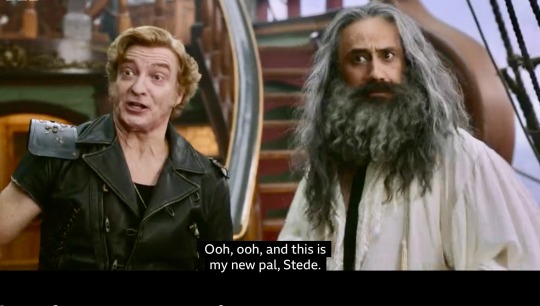
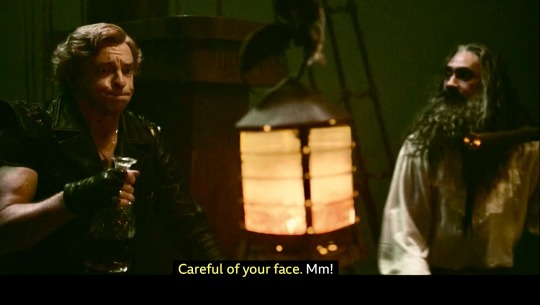
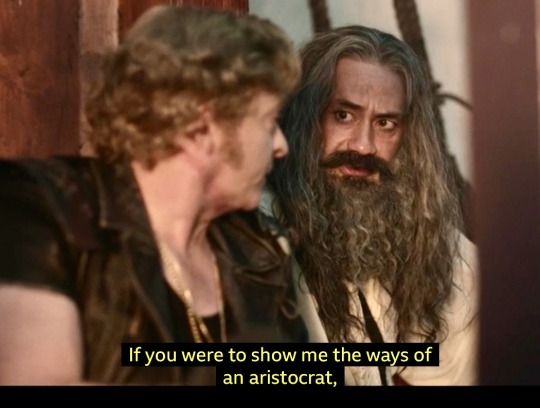
For me, the three strands, which have no previous connection (other than Ed and Stede playing together), come together in Ed’s mind somewhere between Ed leaving Stede on the lookout, and Ed speaking with Izzy below: a matter of seconds. It reminds me of Keyser Söze in The Usual Suspects, pulling together disparate ideas into a cohesive story spontaneously. It’s the mind of a quick-thinker. And it’s in-keeping with Ed’s ability of reacting in the moment to the moment when necessary.
I think Ed also feels forced to perform Blackbeard for Izzy because Izzy’s threatening to leave pushes on that white father-figure emotional bruise. At this stage, Ed doesn’t have enough emotional loyalty to Stede to not voice such a plan; whilst his identity is still too caught in Izzy’s web to let him go - ‘you’re needed here’. For me, the plan to kill Stede is brought about in the moment via an act of psychological coercive control.
But Ed’s also kicking the can down the road. It’s a sort of Faustian bargain. Why not promise Izzy both their souls if it means Ed and Stede can hang out a little longer? Yet on another level Ed’s possibly hoping the debt won’t be called in, such is the complexity of the push and pull here. He’s putting it on the tab, the never-never. He’ll out-manoeuvre it if he decides that’s what he wants. Of course there’s doublethink going on because Ed’s in the middle of an identity crisis.
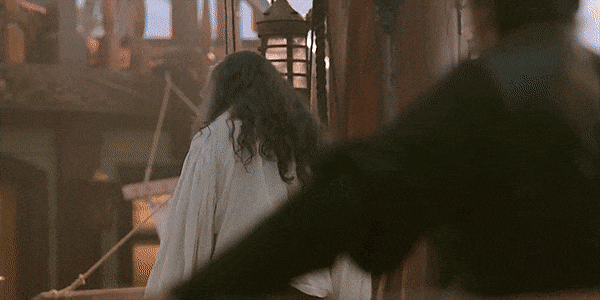
Ed daren’t admit his real reason for wanting to stay on the Revenge. He can’t comprehend himself even how deep this goes. His look as he turns is one of exhaustion and confusion. Stede Bonnet has him rattled. What started as a trickle of unease and ennui before they’d even met is now a whirlpool of unidentifiable feelings around both Stede, and Ed’s own perception of self.
Ed’s free-falling in liminal space.
#ed teach#stede bonnet#104#the plan#faustian bargains#doublethink#identity crisis#liminal space#ofmd meta#ofmd
100 notes
·
View notes
Text
God that David Jenkins interview collection post I just reblogged...
I hadn't read the Paste interview and my god David I have to just...marvel at some of this.
In particular:
"But I think him becoming a father figure to Ed in the last episode didn't really dawn on us until we were breaking the last episode. Asking what would this man say to Ed at the end because they've been together through everything? He went from a troubled and downtrodden employee to a jilted lover to a discarded employee, to someone that is just trying to find his footing again—no pun intended—to actually becoming this guy's parental figure on some level. And he's one person who kind of raised Ed right, because Blackbeard usually kills his parental figures. So, it felt right and it felt like that's how the mentor dies. The mentor in a story usually dies in the second act and then our hero has to go on and try to do it without them. It felt like the right journey for Izzy and a gratifying one for Con."
Like, okay we, the writers, hadn't considered him a father figure or mentor at all until the very last episode where we killed him. But we came up with it as we were writing it.
And then we didn't put anything about it into the episode at all, and then we talk about it in interviews about how obvious it is as a mentor relationship and like...I'm sorry. Yeah it was surprising to all of us as well, because you may have suddenly thought of it like that when you were DESPERATELY trying to justify this death to yourself as NECESSARY because you'd decided it WAS, but you also
DIDN'T PUT ANY OF THAT ON THE SCREEN.
So no, the audience is not on the same page, cause we weren't a part of those discussions you had. That only came up in the last episode. You can't in like 4 minutes of a 25 minute episode, the very last episode of 18, introduce a character dynamic when one of the characters is dying.
That's not how writing for TV works! Does he really think he put the Izzy is a father figure stuff on screen somehow in that death scene? Cause like, sure Izzy is showing AFFECTION for Ed in that scene, but there's nothing there that is PARENTAL. And family, which Ed says, doesn't mean that either. The ship is family. Queer family is different. IDK IDK.
And like it reminds me of something else he said in another interview, about Jim and Oluwande and how "in the writer's room we always thought of them as a friend relationship that got romantic" and that's why they got other partners. But like, okay, if your intent was they were more friends than romantic (which, I'm not sure that's what you mean, but if you're using it to say that's why they are now into other people, okay?) then did you convey that to THE ACTORS? Because it feels like the actors were definitely playing ROMANCE in S1.
That's what ended up on the screen. Two friends falling in love, sure, but actually falling in love and not just two friends who sleep together, as S2 tries to imply.
IDK but I really want to be like, dude sometimes it's not about writer intent. Sometimes it's about what ends up on the screen and you need to step back and look at what your audience is seeing. Because your actors are doing a lot of things that may take things to different places.
122 notes
·
View notes
Note
What's ur issue with edizzy?
Any relationship that ties Izzy with Stede or Ed, I am not a fan of. I live by a ship and let ship philosophy but I will curate my timeline so I don't have to see ships that I personally don't like.
I don't like Izzy with Ed because it is clear to me in canon that Izzy doesn't actually love Ed, and he realizes that at the end when he gets to grow and start to become his own person that isn't clinging onto the persona of BB and the strict masculinity Izzy has been holding onto.
To Ed, Izzy is just another father-like figure that is part of his trauma response. (Captain Hornigold, the fisherman, etc are also part of this.) And at least twice, we see Ed react negatively to any affection offered to him from Izzy. He is not in love with him. And I will even argue that while Izzy loves Ed, he isn't in love with the real Ed. He does wish him well though.
I think a large part of Izzy's season two journey is finding out he isn't in love with Ed. And even if Izzy wasn't killed at the end (I think there were plans to bring him back in s3, there's a lot of foreshadowing in the story, just like there was foreshadowing of his death) Ed and Izzy needed to be apart to grow out of their toxicity.
The Discomfort in a Married State episode seems to be peoples biggest evidence of a sexual edizzy. But I think that's a baseline reading of what that episode is trying to communicate. It is not about sex/romance, it is about the societal expectations that are causing the discomfort. For Stede, it is about living in this married state and the societal expectations in it, while he is incredibly unhappy. So unhappy, he runs away, and is even suicidal, but would rather live a short life as a pirate then continue living in "discomfort." For Ed, it is the societal pressures of being Blackbeard. He is also suicidal and trying to get away from it and we see him tell Izzy this directly in this episode, and Izzy's response is basically, buck up and pull yourself up by your bootstraps. (Now there is a whole thing of Izzy as the middle manager trying to keep his bad boss and the crew in check, which is why he responds like that reading. But also, I will say Izzy constantly lies to the crew, to Ed, to whomever, and I don't think it's always to "try to keep everything working" or however you want to phrase it. A lot of times it's to his own advantage, and the show also shows that he's in the wrong. It may be done in a funny way, but throughout both seasons, Izzy continually makes the wrong choices by the narrative.)
Years ago, Ed and Izzy may have gotten along but not anymore. That's why Ed and Stede work so well, they are confined by society and those societal norms being put up on them by outside forces, but together, they can just be themselves.
I haven't even touched upon the abuse side of things because I know that's a tricky subject, but I don't want Ed or Stede to be with their abusers.
You did not ask about stizzy or Steddyhands, but I'm on a role, so here goes.
I read Stede as demisexual. I think there is also a very clear canon reading and support of that theory. And it is also clear he wants Ed, and only Ed. Doesn't mean he hasn't had dalliances with others in the past, but once he's set his mind on Ed, that's who he wants. Because it's Con playing the character, he has sexual vibes with everyone, and that can be easy to play into if you want to ship Izzy with anyone. It makes sense. Especially cause Con will repost any Izzy art, including any Izzy ships, because he is a great man who wants to support art and support us.
But stizzy just doesn't make sense to me, for reasons stated above.
And for Steddyhands, I have found that most people who support Steddyhands are usually using it as a way to heal Izzy. Or that Ed and Stede are too "whim-prone" and they need Izzy to balance them out. And that is clearly taking away both Ed and Stede's agency, which could be a whole other discussion. Also, Izzy has represented the toxic masculinity of being a pirate, and he gets to grow away from that, but not completely. So teaming that person up with the two men, whose entire journey is to get away from societal norms, and not fitting into society because they aren't playing their masculinity right, to become themselves and live by their own rules, takes away the entire thesis of this show and their relationship.
Now having read all this, you may think that I hate Izzy. And the thing is I don't. I love canon Izzy. I don't particularly like fanon Izzy, and quite frankly his more extreme fans have tested my patience on my love for him, but I find him intriguing. But Ed and Izzy's relationship in canon is absolutely fascinating and I loved seeing Izzy's journey over the two seasons. I just don't think it being tied to Ed and Stede sexually/romantically is it. Not for me. But as I said, ship and let ship.
26 notes
·
View notes
Text
season 1, episode 13 discussion post “morning star” part 1 because who are we kidding, this will most likely have many parts
1. so I just want to start off by sharing some side note. I was rewatching the Malec episode (BECAUSE ITS THAT GOOD) and I noticed again that Tessa, ragnor, and Catarina are linked up being more powerful than Magnus. I can understand ragnor and maybe Catarina but Tessa?
2. I’m sorry but how is Tessa more powerful than Magnus? I get she can shape shift but in the show, so can shadowhunters so what power exactly is she holding? I’m not that much of a fan of Tessa (maybe if the writing was better) but in what universe is she more powerful than Magnus? she has a prince of hell as a father but isn’t asmodeus more powerful than belial????? Magnus has been around longer so I would assume that he’s had more time to prefect his magic and find out what other skills they have
3. I just can’t get behind the idea that Tessa is supposedly more powerful than Magnus like it’s not making any sense
4. also if ragnor is more powerful than Magnus- why is he easily defeated? he got hit by a Shax demon and from what we know (I cheated and checked the codex book I have) they can wound living people and lay eggs in them and shit. I’m sorry, I know I’m being extra critical but come on now. I’m still a bit bitter that ragnor was killed off
5. I think this is the issues that arise when doing adaptions of books. you need to figure out how much of that world you’re going to keep because some things will not add up if you don’t. the show stated in the beginning that they wouldn’t be doing the show exactly as the books. (and we all screamed YASSSSSS) if Tessa = powerful than why do shadowhunters have the ability she does? if ragnor is more powerful than Magnus, then how was he so easily killed? LET RAGNOR LIVE OK??????
6. IM SORRY BUT IT DOESNT MAKE ANY SENSE. RAGNOR DID NOT NEED TO DIE. like they didn’t need to keep him in every episode but he could’ve popped up the way catarina did
7. and I do love the show for Malec content as well as Izzy, Simon, Maia, Raphael content but what I can’t stand is lazy storytelling or plot armor. (huge example- TVD) maybe it’s not that lazy because season one with the cgi is not as it’s greatest but they should’ve hired me as a writer. I HAVE LOTS OF IDEAS WITH THIS SERIES AND I WOULD HAVE HANDLED IT BETTER THAN CC I WILL DIE ON THAT HILL
8. well, let’s get to get to it 👏🏼
9. “one thing I know for sure jace is that you are not a bad person”- clary. yeah so I’m not going to put any faith in clary because let’s understand clary is the one who is saying that. one terrible person uplifting another one. how fun! who is clary to decide who is morally right and wrong???? girl check thyself
10. “calling off the wedding would’ve been one thing but kissing that warlock in front of the entire institute?” ok Maryse your prejudice is showing once again smh

11. Alec: because he’s a man?
12. Maryse: no I don’t give a fuck if you’re gay alec. I care that he’s a warlock. it’s like one step forward and one step back with Maryse. and if you’ve never seen the show, Maryse does get better and she’s a whole lot better than Robert in the books so it’s sort of an improvement. you just have to let show Maryse be bad for a sec
13. “that he’s a guy is the least of my concerns”- ok so cold hearted Maryse isn’t homophobic just racist apparently FUCKING HELL 💀

14. “even for a warlock, he’s a lothario”- Robert 👀 (YALL KNOW THE SCENE)

15. “so I suggest you deal with it.”- Alec has spoken and he’s leaving no dust and no crumbs and no smoke (I don’t think I did that slang right but A+ for effort)

16. and this is why I will always love show Alec. he really doesn’t care if he hurts your feelings. he’s not going to stand to the side and allow people to hurt himself or the people he loves (I’m talking Magnus and Izzy). I never got the feeling that book Alec was anything like show Alec. his whole purpose is to protect jace and he hardly stands up for himself. Matt said nah show Alec is going to be nothing like that. my boy will tell off all these fuckers!!!!!! I mean, he probably didn’t say that lmao but I can dream and hypothesize or whatever
17. so I couldn’t find the gif of Alec telling Maryse off but I uploaded the whole thing and don’t mind my mess
18. and I know I go on and on about show Alec being better and you’re probably like bitch could you shut up for once but literally HE IS BETTER. I cannot think if Alec actually stood his own in the books. he once told jace off but that’s in the sixth bloody book. like did it really need to take Alec six books to DEFEND HIMSELF AND MAGNUS??????? and eldest curses is an improvement but in no way shape or form will the books ever be better
19. Alec has had on multiple occasions went off and stood his ground in the first season. the gifs below is one of the times:
(and also the video after and telling clary about rules and how they exist for a reason (episode 4) and then once again how she couldn’t understand when follows Lydia’s orders a few episodes later, and also telling Magnus off in episode 12 😭)
that’s about five examples already in season one. season one is only 13 episodes and our boy Alexander has already stood his ground, defended himself, and basically said NO IM NOT TAKING OR HAVING ANY OF THIS.
CAN WE BE PROUD OF HIM??????? I THINK WE CAN




20. I think that was either episode 5 or 6 (I’m sorry my brain is unbrainable) but that’s a good example of alec being like the fuck?????? show Alec doesn’t stand around waiting for excuses. he’s going to tell you what’s on his mind and I love him for that
21. and I know I’m posting stuff that isn’t really about this episode but I also want to share this video that is in episode 11 when Alec goes off on jace because apparently jace always knows what’s best and Alec is not having it. it’s just really important for Alec to have a voice and not be pushed around like he was in the books. I think for a head of the institute to not only be heard, have a voice, plus be a gay man is everything we needed and more. Alec deserves to be heard and to be happy. he’s not a babysitter, he has feelings and emotions. there are rules in place for a reason. but it’s also the hypocrisy of jace. telling Alec off for whatever reason and Alec is all like ??????? bro my sister could have been deruned and you ran off with the cup PLUS almost handed it to Valentine like is this dude for real?????
(I’ll upload the video in the next part)
22. and it’s also why I can’t get behind jace. he doesn’t get better, doesn’t change, or adapt. I seriously don’t get why everyone is so adamant of saving his worthless ass. he never seems to be grateful about it either. Jace is supposed to be the best shadowhunter of his time and so is clary yet they always need saving?
23. so back to Alec going off on Maryse! leaving no smoke, telling it how it is. I love how Alec is saying: I really don’t care if you’re disappointed in me but I plan to get to know Magnus and if that’s a problem then get over it 💀 i fucking love him
24 24 24!!!!!!! moving to part 2 shortly while it’s in the editing stage
#anti cassandra clare#anti cc#just my stupid opinions#alec lightwood#magnus bane#anti jace herondale#anti clary fray#anti clace#show alec is superior#show magnus is superior#show malec is superior#putting anti cc on all show shadowhunter posts because i don’t want an pro book fans hating on my shit#shadowhunter show is superior#shadowhunters tv#GO OFF ALEC!!!!!!!#I’m just here for Alec standing up for himself#Maryse girl why do you have to be so prejudiced
3 notes
·
View notes
Text
What is it with the OFMD fandom's ability to see multiple layers to everything as well see metaphor and symbolism in everything except when it has anything to do with Izzy Hands?
Season 1 and the virulent hate of Izzy because somehow, every other character in the show including Calico fucking Jack had multiple layers to them but Izzy was taken at literal face value. [s] Because there was obviously nothing more to Izzy than what was shown and nothing he said could have any meaning except the worst one possible. [/s]
Season 2 comes around and all of a sudden people start liking Izzy because [s]gasp, shock[/s] maybe he does have layers after all.
Then, FUCKING THEN!!! David Jenkins says Izzy represents a father-figure/mentor for Ed. And once again [!!!!!!!!] people lose the ability to see metaphor and symbolism and layers to Izzy and his relationship with Ed.
Edward and Izzy's relationship is complicated, messy and multifaceted. In this show (using Taika & Con's ages) Izzy is nearly 10 years older than Edward. (Unlike history where Izzy is approx. 20 years younger than Ed) So the mentor aspect makes perfect sense. The father-figure aspect IS NOT meant to be taken literally at face value. It is symbolism and metaphor.
{Metaphor :: a figure of speech in which a word or phrase is applied to an object or action to which it is not literally applicable. :: a thing regarded as representative or symbolic of something else, especially something abstract.}
The hypermasculine, toxic, violent version of Izzy from season 1 was meant to be symbolic of Edward's father and Hornigold. That is where the father-figure aspect comes from. Not "Edward literally sees Izzy as a father", because he doesn't. A mentor, yes. Or at least he was a mentor early in their relationship. A relationship that has changed and evolved, probably many times, over many years. Their relationship is complex and multifaceted, it's not just one thing, and it's not neat and tidy. They love each other in multiple ways and it's all extremely messy. And neither of them loves the other in quite the same way or in the way that either of them actually need. Messy. Complicated. Layered.
One more thing of note:
Why can't Izzy be the new Captain of the Revenge? He's getting along better with the crew. Has learned how to work with them. Accept them and they've accepted him. So why couldn't he be the Captain?
Izzy is not a strategist, though he is a decent tactician. He is a combination of a Bosun and an Ops Officer. Which means he keeps the ship running in working order (requiring the crew to do maintenance) and he makes sure the Captain's plans and orders are carried out and implemented as efficiently as possible. But he doesn't make the plans. He can think and make judgement calls and decisions as events are unfolding (tactician) but he doesn't always see the larger picture (strategist). He also doesn't know how to lead without force. He can either work with the crew as part of the crew OR he can lead them but he doesn't know how to do both. Making Izzy Captain would just have the crew turn on him again. It wouldn't happen as quickly as it did last time and they'd probably take him to (or near) land before they forced him off the ship (possibly even dropping him on Stede & Ed's doorstep tied up and gagged) instead of trying to kill him, but it would still end badly.
9 notes
·
View notes
Note
Yes, being uneducated as a child is my headcanon. It makes perfect sense to me since so many people of Ed's background at the time were. I also agree that he likely can read a little bit, though not well, but don't think he can write properly at all.
Learning to read and write in childhood was reserved for the higher classes at the time, unless you were very lucky to know someone who could and who cared enough to teach you. Ed's mother might've taught him if she herself could, but his father would absolutely not care enough to get him any sort of education. If he himself could even read and write, and it is just as probable he couldn't either.
If you know of Harpo Marx, who was a very famous actor and comedian of the 1920s and 1930s, and his upbringing then you'll see what I see for Ed. Harpo didn't learn to read properly until later in life and never learned to write properly. Well into his 50s would write things like "sizzers" and "wadder" instead of scissors and water. He couldn't even write his own name for most of his life. Harpo was also a certifiable genius and highly skilled in music to the point that he taught himself to play the harp when he was still in his teens.
That is what I see for Ed. Uneducated in reading and writing but highly skilled at other things. You do not need to be able to read properly to do maths. Just ask anyone with dyslexia and yet no issues working with numbers. You just need to be able to recognize the figures and how they work together in a given situation, which Ed has shown he's very good at. That alone should be proof enough he's very far from stupid, even if he is uneducated. Being uneducated does not make anyone stupid.
Okay. You're allowed to have that headcanon. I agree that being illiterate doesn't make someone stupid. And if the headcanon existed in isolation, it wouldn't be a problem.
But it doesn't. It's just one aspect in an interpretation of Ed that makes him out to be uncultured, uneducated, unfamiliar with basic things, and dependent on white people. I'm not saying this is how you see him. But this uncharitable (and wrong) (and racist) interpretation of Ed exists, and it's part of a pattern behaviour common across many fandoms, where characters of colour get sidelined, or misinterpreted to fit racist stereotypes. And details like this are never just details.
For example, the headcanon that Ed is illiterate often goes hand in hand with "Izzy has to do the reading/writing for him". Which fits into the larger pattern of "Ed needs Izzy to take care of/manage him".
Or the "Ed eats soap" joke: Part of a larger pattern of "Stede has to teach Ed about things like proper hygiene and skin care". Again this fits into "Ed needs a white man's help for basic life skills".
I'm not saying that this pattern is always (or even often) intentional. Growing up in a racist society, we all have racist assumptions in us that we need to unpack. This is why I said I would like people who just assume he's illiterate to look at that assumption and think about why they have it. Because assumptions can often be warped by biases we maybe aren't even consciously aware of.
Now I am not saying that you personally see Ed (or other characters of colour) like this, or that you're a bad person for having that headcanon. But I hope you can understand why it's such a hot button issue, especially when it's brought up in the way it was in that post.
#like. believe ed is illiterate if you want to im not the thought police and i cant stop you#but i will not agree with you & thats okay i think#people are allowed to have differing fandom opinions#anonymaus#message#our flag means death#edward teach
9 notes
·
View notes
Text
my fair lady: part seven - a gwourtney choose your own adventure!
(part one | part two | part three | part four | part five | part six) (read on ao3)
“Got any more poop juice?” Gwen asks.
Alejandro immediately blanches.
“Excuse me,” he mutters, sliding out of his seat. “I have to…”
He quickly hurries away. Gwen plops down next to Courtney.
“Does he think I just have a bucket of the stuff under the seat?” Courtney asks bemusedly.
“I dunno,” Gwen says, “I’m just glad that worked. Did you get him on our side?”
“Yup. He thinks we want him for the majority vote to get Heather and Noah out.”
“Well, Heather and Noah think the four of us are going to vote him out the next time we lose. But not purposefully throw the game. It’d be bad if Alejandro figured out what we were up to before we got him out.”
“Here’s what I think we do,” Courtney says. “We try to win, obviously we try to win, because winning is good, but if we lose—we vote out Heather first, ‘cause she sucks. Then the next time we lose we vote out Alejandro, because he’s a major threat. And he won’t expect it ‘cause we’ll have voted with him against Heather. Then we can vote out Noah, who won’t have anyone on his side once we get Heather out.”
“That’s a solid plan.”
“Thanks! Hopefully we can get it all done before the teams merge. Then we’ll figure out how to make it to the finale together.”
“Make it to the finale together?” Gwen echoes.
“…I mean, I thought we’d be allies all the way through, but if this is just a Team Amazon thing—”
“No, no! I just didn’t realize you wanted us to be long term. I’d love to be your ally.”
Courtney smiles.
Gwen smiles back.
Of course, Chris just has to interrupt the moment by busting out a microphone and monologuing. “London! Home to loads of wicked stuff…”
He goes on and on about Jack the Ripper—
Awesome, Gwen thinks.
—and the Tower of London—
Awesome, Courtney thinks.
—before directing the contestants to sit with their teams for the remainder of the bus ride. As the rest of their team is sitting near the back, Gwen and Courtney get up and sit down by them.
“This isn’t my first time in London,” Alejandro tells Team Amazon 2.0. “I’ve traveled with my father here for his work before. I’ll put my knowledge to good use.”
“Speaking of knowledge,” Gwen says, “I know so much about Jack the Ripper that my librarian tried and failed to ban me from the school library for scaring the other kids. It was for a sixth grade speech.”
Courtney grins. “Wait, really? My sixth grade speech was on the Tower of London!”
“Wow, that’s serendipitous.”
“I can tell you didn’t get banned from the library with that kind of vocabulary.”
“You guys flirt weirder than Owen and Izzy,” Noah says, “and that’s saying something.”
Alejandro raises an eyebrow. “What about you? Any knowledge to contribute to our challenge?”
“I know plenty of British stereotypes in order to more accurately mock them.”
“…Fair enough.”
Soon after that conversation, the bus pulls up to the London Tower, and Chris herds the teenagers toward two guards.
And then he explains the challenge.
“We have to strip them?” Heather groans. Nobody else looks too pleased by that development.
He's a grown old men! Courtney thinks. Ick! No way am I doing that!
Someone has to, though. And someone has to decide who does it.
Team Amazon needs a leader, and Courtney was born to lead. And make sure it’s not her taking the clothes off of some old British guy.
“Okay, team…”
#pjs td oneshot polls#total drama#td courtney#td gwen#gwourtney#total drama world tour#tdwt#td fic#fic#my fic
18 notes
·
View notes
Text
The Vicar's Betrayal: Part 13
SPOILERS: The following contains spoilers for The Outer Worlds and The Empty Man (Max's companion quest)
‘Are you ready?’ The captain asked him, her eyes shimmering through the faint smoke coming from the censure. Max nodded, clearly looking more sure than he felt as the captain leaned over and inhaled the fumes. She stepped back, coughing and waved at him to proceed. He did as she bid him, breathing as deeply as she had. Immediately his head began to swim, the room flickering around them like a candle flame. For an aching, horrible moment, nothing happened.
‘Poor, poor Maximillian.’ The voice was gentle but clear, and definitely not the captain’s. Max whipped round, panic snapping at the edges of his mind. That voice. He knew that voice. It’d been years, decades, since he’d heard that voice. Out of the flickering walls, a figure stepped forward. She was indistinct at first but even before she had fully manifested before them, he knew who it was. Of course he did.
‘Maximillian, why are you still doing this?’ The figure cocked her head at him, her voice ethereal but, Architect help him, as familiar as his own. Isadora. His father had called her Izzy. ‘You’ve been fighting against the world since before you left home. Haven’t you figured it out yet? That the more you fight the more pain you cause yourself?’
‘Mother? You... you can’t be here. You’re dead!’ His voice was ragged and felt harsh in his throat. Then that fiery rush of familiar anger. ‘I knew this was too good to be true! These are just cheap hallucinogens.’ He worked his jaw. His voice sounded strange to him. His mouth felt like it was a step behind his mind. ‘We... we’re being made fools of aren’t we? When I get out of here I’m going to show that hermit what you get for messing with me.’
‘Max,’ the captain groaned. ‘Will you please stop threatening to murder people and listen to what your mother has to say.’ That startled him. Could the captain see her too? No. No of course not. They’d both just taken some potent drugs and the captain was responding to what he was saying. Yes, that was the rational explanation. But the ghostly vision of his mother was shaking her head.
‘Maximillian.’ The disappointment in her voice. That was also, unfortunately, familiar. ‘Always so ready to give up, to lash out. Always searching for answers but always in the wrong places, never looking inside himself.’
‘We came all this way Max,’ the captain’s voice sounded just as far away as Isadora’s. ‘Let’s at least hear her out.’ Max clutched his head as his mother turned to the captain.
‘Thank you. It relieves me to see there’s at least one positive influence in my son’s life.’
‘I try my best ma’am,’ the captain responded meekly. Isadora turned back to face her son. Max felt like he was a child again, coming back in after another fight with blood on his knuckles and a fat lip, his head hanging low as his mother cleaned him up. She would never say anything but he could see the disappointment in her eyes. He could see it now.
‘I only wanted you and father to be proud of me! I was going to be the perfect vessel... I was going to um... be more full of the Plan...’ It sounded so foolish. So childish. He shook his head in frustration. ‘This here... it’s all coming out wrong! The Plan, it filled you with such joy, a joy I could never feel. I wanted it! And being a labourer made me miserable. I was better than that!’
‘You certainly convinced yourself that you were.’ Max flinched at his mother’s tone, but then her voice softened. Suddenly it felt like the words were coming from inside him, inside his very soul. ‘Don’t feel bad Maximillian. We continually lie to ourselves, weaving stories in a vain attempt to convince us that we are in control of... anything. These stories are how we try to make sense of our lives but they are not real. They are just... stories. You need to let go of your story to see the truth.’ Max was shaking... his head, his body, he didn’t know any more. The words felt like they were reverberating in his chest, hammering away at everything he was.
‘Your mum is right, Max. Your story blinded you the truth and landed you in prison.’ The captain sounded so sure. How could she be so certain about anything in these circumstances?
‘What the... fuck... are you talking about?’ He snapped.
‘Look where we are, Max! Trusting an unbalanced hermit with your sanity seem rational to you?’ Max opened and closed his mouth as he tried to order his thoughts.
‘No!’ He sputtered. ‘I just wanted to prove to my parents that... I... dammit! You... you’re right.’ Isadora smiled at him then. He’d missed that smile.
‘Max, you need to lay down the past.’ His mother’s voice was gentle now. ‘What happened with your father and I is long dead. To attain your goals, you must live in the chaos. Whether you resist it or not, it will take you wherever it wants, more assuredly than your fictional Architect’s Plan that you slave away to prove.’ That struck a nerve.
‘No! The basis of everything is order, not chaos! It’s true I know it is! Why are you denying it? Before you died the Plan made you happy.’
‘No, it didn’t. I made myself happy. There is nothing holding you back but you. Goodbye, Maximillian.’ He reached out as she faded away. He didn’t want to let her go. He didn’t want to hear her words. He’d been so certain, so absolutely convinced he was right. This... this didn’t make any sense. He turned to the captain who was staring at the space Isadora had occupied with a faintly nauseous look on her face.
‘This whole thing is... it’s just a farce right?’ He hated how weak he sounded, how much it sounded like he was pleading with her. ‘Just... just my own brain working against me?’
‘You couldn’t be more right.’ Both the vicar and the captain stiffened and turned towards this new figure, who was wearing a familiar smirk. ‘Hello Max.’ He felt like his heart was going to break out of the cage of his ribs. This new vision was wearing his face, but his back was straighter his face and countenance calmer. This new Max standing before him seemed more real, more solid than the vision of his mother had been.
‘Why... why do you look like me?’ The vicar managed to force out eventually. ‘Are you me?’ The vision cocked his head, mulling over the question.
‘Not really,’ he answered diplomatically. ‘I’m who you think you are. I am disciplined. Controlled. I have no doubts. And I don’t exist, yet you have judged yourself against me you’re entire life. Why? Why do you berate yourself for not being me?’
‘If he does, he shouldn’t.’ The captain’s voice was sharp and clear. She glared at this new version of Max, her nose wrinkled in distaste. ‘He’s a better man than he gives himself credit for.’ Max felt himself blush with the captain’s praise but doubts still nagged at him. He felt like he was spooling out from himself, unravelling like fraying rope. And this new Max before them was so solid and self assured...
‘I... I don’t know.’ Max swayed with the room around him. ‘Is it wrong to want to be a good-er... uh... better person than I am?’ The captain was looking at him with fire in her eyes. He wished he had her certainty. She was always so sure of everything. He wasn’t, of anything anymore.
‘But that’s not what you’re doing,’ the vision-Max responded. ‘You’re desperately trying to find a story to organise reality in your head, a story to control everything. A new story of the happy you. The contented you. Me.’ This new Max smiled and Max (The real Max? He didn’t know. He didn’t feel as though he was real anymore) felt the bottom drop out of his stomach.
‘That’s not... it can’t be right. I’ve been searching for the answer to the Equation. Because it will set us free... won’t it?’ Max was no longer as convinced of that as when he had first set foot on this asteroid.
‘How?’ His twin threw up their hands. ‘By removing the need to make any decision? To have your life completely controlled? The illusion of certainty? Your obsession allowed you to avoid the real question. Who are you?’ Once again, the words seem to come from within his chest, rattling his lungs and heart, shaking the very foundation of his being. He felt like he was choking, drowning.
‘I’m Max!’ He shouted desperately. ‘Me! I’m real! You can’t convince me otherwise... please... please don’t convince me I’m not...’ He was losing himself, he could feel it. Things were spiralling out of his control. He felt untethered and adrift. Then he felt the cool, familiar touch of the captains fingers. She entwined them with his, standing firm beside him like an anchor.
‘Stop, Max. Listen to what he’s saying,’ the captain urged.
‘Your individual “self” is not real. It is simply a concept.’ These words also rang in his chest but now he shook with them. He was breaking apart, the pieces of what he thought he was were drifting away from him but... he realised he was OK with that. He was loosening his grip on his ideals even as his fingers tightened around the captain’s. And this loss of control was... freeing.
‘By the Architect...’ Max laughed at himself. ‘Architect? How could I have believed in an Architect? We exist outside our thoughts, thinking we’re in control... that’s it isn’t it? We have no control, over anything! It’s all... lies. How could I not have seen this? But how do we escape... ourselves?’
‘I’m... not sure I followed all of that... but you’re doing great Max,’ the captain said, swaying beside him as the vision-Max faded away with a smile. ‘Do you think the hermit would mind if I threw up in a corner?’ As Max felt his mind unfurl, the captain's eyes rolled back into her head.
#the outer worlds#the unreliable#vicar max#maximillian desoto#female captain#ellie#fanfic#felix#parvati#nyoka#slow burn#romance#angst#angst with a happy ending#guilt
3 notes
·
View notes
Text
Comics read this past week:
Marvel Comics:
Captain America/Black Panther: Flags of Our Fathers (2010) #1-4
These issues were published across April 2010 to July 2010. All were written by Reginald Hudlin, penciled by Denys Cowan, and inked by Klaus Janson, and colored by Pete Pantazis. All were 22 pages.
I read this miniseries just for the sake of reading random Captain America comics, and I wasn’t expecting to really get into it. To my surprise, the Howling Commandos were a part of this story, despite not being in the title or on the covers. And Gabe Jones specifically was a prominent character, with a lot of the book being from his perspective. Sgt. Fury and his Howling Commandos (1963) choose to portray him, as a Black man in the otherwise all-White Howlers during WWII, as largely non-controversial, eschewing any historically-accurate segregation for the sake of normalizing integration. So I appreciated this modern book revisiting that era and taking Gabe’s historical circumstances and his perspective seriously.
So far in the issues of the series I’ve read, only Sgt. Fury (1963) #6 (written by Stan Lee; penciled by Jack Kirby; inked by George Roussos), published January 1964, as a sort of special issue, portrayed racism against Gabe by an American soldier (as opposed to comments by Nazi enemies). A temporary Howler, George Stonewall, was unfriendly to Dino Manelli, who’s Italian-American, and Izzy Cohen, who’s Jewish. And then he was particularly friendly to Reb Ralston, who’s from the south, calling him “one of my kind.” But the Howlers were all oblivious until George cried, upon meeting Gabe, “No! I’m not sleepin’ in these barracks!” Nick was enraged, but Gabe reassured him, “He won’t bother me none, Sarge! I’m used to his kind!”
But on the mission Gabe was actually bothered by George. Gabe wanted to physically fight him after he complained about Nick “lettin’ someone like him in the squad! Why don’t you send him back where he belongs?!!” George was emphasized to be anti-Nazi, and his behavior was felt by him to be a commitment to what he thought of as American values, as opposed to something like it being revealed partway through the story that he was actually a Nazi spy.
Ultimately George and Izzy had to work together in order to not die, and so Izzy commented, “I notice you ain’t complainin’ about my religion all of a sudden!” Then when George was seriously injured, Gabe donated his rare same blood type to save his life. When George woke up he was initially upset to see he’d been given Gabe’s blood, but then at the very end of the story he indirectly left his Army Post Office number to Izzy and Gabe, suggesting he wanted to have some kind of friendship with them going forward. Nick concluded the issue by saying, “The seeds of prejudice, which takes a lifestyle to grow, can’t be stamped out overnight- but if we keep trying- keep fighting- perhaps a day will come when ‘love thy brother’ will be more than just an expression we hear at church!”
We haven’t seen any other Black soldiers so far in the series. Sgt. Fury (1963) #38 (written by Roy Thomas; penciled by Dick Ayers; inked by John Tartaglione), published November 1966, did imply segregation by portraying a specifically Japanese-American squadron. And there was racist abuse (not by any of the Howlers) against the one named member of it, Jim Morita, which was unlearned by the end of the issue. Before that, after Nick intervened to defend him, Jim had said of the bigotry, “I kind’a figure it’s my job to change their minds, anyway!” Also, while looking stuff up for this, I learned that the Stage Door Canteen in Broadway, which the Howlers visited in Sgt. Fury (1963) #24, was integrated.
In issue #1 of this book, Gabe describes him joining the Howlers as, “When Fury put together this squad, he had his pick of the litter. Warhorse like him, he didn’t care that the army wasn’t integrated yet. He just wanted guys who could knock a Nazi’s block off. I’m the first Negro to kill Nazis alongside White American soldiers. And I like my work.” This narration is over a scene of Nick looking over a row of African-American soldiers and choosing Gabe. In Sgt. Fury (1963) #34 it’s portrayed simply that Gabe was one of the soldiers assigned to him and his race wasn’t commented upon by Nick, though Junior Juniper’s age was.
Gabe is surprised when Captain America sits next to him in the mess hall, which was because that happened to be the only seat still open at the Howler’s table. And then Gabe’s surprised when Captain America chooses to eat with his silverware, “a fork that only a minute ago had been in my mouth,” which Gabe was finished with, simply because there wasn’t any clean and Steve didn’t want to wait to eat. In this book, as in Sgt. Fury (1963), there’s nothing to indicate that the Howlers dislike sitting or sleeping next to Gabe, but I think is a step even further beyond what Gabe’s used to with them.
And Gabe is wary when the Howlers are assigned to a mission in Africa. He thinks, “I’m not ashamed by Africa, like a lot of Negroes are, but the likelihood of at least one of the Howlers saying something dumb is pretty good.” He then feels proven right due comments about “Tarzan” or “a tiger” possibly being in the jungle, though these ignorant jokes were fortunately without any contempt. This is notable because it’s the first I’ve ever seen of any kind of wariness towards the Howlers from Gabe. In the beginning of the issue Gabe had thought “I hate Nazis. Fortunately, I hang out with guys who feel the same way. The Howling Commandos. We’re getting a reputation. Nick Fury heads up our outfit. He’s my kinda guy.“ This gives the impression to me that Gabe has a high opinion of Nick, but doesn’t necessarily have the same level of faith in the other Howlers.
When it appears Captain America is being taken prisoner by the Wakandans, Gabe is silent throughout the others’ chatter. And then when Nick says they’ll attack if Steve can’t resolve the situation diplomatically, he thinks, “I don’t like this at all.” I thought it was interesting that Gabe would be sympathetic to the Wakandans for defending themselves against what they see as invaders.
In issue #2 Nick asks Gabe, who’s been impressed with Wakanda, to spy because he’s worried that Steve is too trusting of T’Chaka, the Wakandan King. Nick expresses his trust in Gabe as “‘Cause you’re a Howler.” But Gabe thinks, “I find myself in a Black man’s paradise, only to be asked to spy on another Negro to see if he’s a Nazi puppet, an overconfident fool, or if he’s telling the truth. Am I scared to find out it’s not real?”
In issue #3 Nick tasks Gabe with stealing some Vibranium. When Gabe questions why he was chosen for this, Nick justifies it with “If the Wakandans liked Reb more, I’d be giving this assignment to him.” Ultimately, after hesitating, Gabe says, “You can count on me, sir.”
In issue #4 Gabe saves the two Wakandan princes, including T’Challa, from one of the Nazi attackers. The Queen then says to Steve, “You and this young warrior should work together more often. Perhaps get him a colorful outfit like yourself. Such a statement would help clarify matters back in your home country.” This is essentially pitching Gabe as a proto-Falcon. Steve responds, “Ma’am, those kinds of decisions are above my pay grade.”
Later, in gratitude for Gabe saving his sons, and because he says he believes Gabe has “conducted yourself with class and honor” in his time with Wakanda, T’Chaka offers him Wakandan citizenship. Gabe decides to turn this down, explaining that “even if I lived here, I’d still want to fight this fight. And when I get home, I gotta fight that fight too.” But he then lies to Nick, saying he wasn’t able to steal any Vibranium. Nick doesn’t believe him and questions, “Maybe you’re not clear where your loyalties are. Wanna stay in paradise?” Gabe admits, “I do… But I’m here anyway.” And Nick, after hesitating, accepts that.
Some of Steve’s conversations with T’Chaka were also interesting to me.
In issue #2, Steve and T’Chaka discuss “cooperative efforts,” which would be “under the proper terms.” Nick tries to interject, and T’Chaka says, “Those terms will ensure there is a Wakanda, and not just the latest annexation of an empire.”
Steve tells T’Chaka, “I think this war will cause a lot of Americans to rethink their attitudes. You can’t go to war with a bunch of jerks who call themselves the master race and turn around and do the same thing back home.” This phrasing was not believable to me as spoken by someone from the 1940s. Certainly there were some Black Americans who felt that they should not go and risk their lives supposedly for values that they weren’t actually treated by, and other Black Americans who did serve and came back home motivated to fight for the same values they did overseas for themselves. But I don’t think someone from the 1940s would think of racism as something as simple as that serving in this war would just change all those White Americans’ minds.
I appreciated T’Chaka telling Steve in response, “As a symbol of your country, your actions take on great weight. The true test of your ideals will come when the war is over. […] A nation at war has an enemy to unify them. A nation with no enemy… often looks for one within its own borders.” I think this is an interesting concept to raise when Steve was famously frozen in ice and not in his country in the decades after the war, including for the Civil Rights Movement and the Second Red Scare.
Steve also tries to convince T’Chaka to join the Invaders.
And while T’Challa, as a child, is in this story, he and Steve specifically never interact on-page.
Sgt. Fury and his Howling Commandos (1963) #41-42
These issues were published across February 1967 to March 1967. Both were co-plotted and penciled by Dick Ayers, with issue #1 written by Roy Thomas and issue #2 written by Gary Friedrich. Both were inked by John Tartaglione. And both were 20 pages.
Colorists aren’t usually credited in this era’s comics, and I don’t usually pay as much attention to them, anyway. But, notably, Gabe’s skin changes in this series from issue #40 to issue #41 and onward from gray to a dark brown that’s actually believable for a human being’s skin color.
In issue #41 the Howlers star in a propaganda movie that Dino directs, which is a cute concept. And Dino falls in love with and gets engaged to the leading lady, Nina Bergson, even though they only met a few weeks before. Their serious relationship is a surprise to the other Howlers, who think of Dino as a ladies’ man. Dino decides, without Nina having first raised the idea, to accept his discharge from the army to be with her. This was surprising to me because Dino was upset when he was first injured in issue #35 and said, “I enlisted in this man’s army the day after Pearl Harbor… and I don’t like quittin’ while the job’s just half done!” Then in issue #38 the other Howlers risked their lives to save the one doctor that could get Dino back in fighting shape from a POW camp after Dino said the possibility of his help was “always in the back of my mind.” And in issue #40 Dino talked with excitement about being “ready to take off after Uncle Adolf’s boys again!” But then Dino changes his mind about getting discharged on his own, too, so the Howlers never find out about this. Dino explains to Nina, “No man has the right to say when he should quit fighting… not while a madman like Hitler still controls most of Europe!” He also tells her, “The war hasn’t touched you personally, so I don’t guess I can expect you to understand!”
Nina is really a Nazi spy that was assigned to make Dino fall in love with her, but she becomes conflicted because she’s fallen in love with Dino for real. She’s unable to convince him to leave with her, even though she says he’ll never see her again if he doesn’t right then and there, and Dino promises Nina that he will never forget her. Then, having been unable to make herself leave as she knows the surprise attack is imminent, at the last moment Nina tackles Nick and the British Prime Minister, who is strangely never named, out of the way of incoming bullets. She’s fatally wounded by this. She confesses as she lays dying that she was a spy, which Dino had already figured out from that she knew the attack was coming before it happened, but Nina also confesses her genuine love. And Dino repeats his promise to her that he will never forget her.
At the end Nick says, “I know it don’t help much for me to say this, Dino…. but, we’re gonna pay ‘im back! For Nina… for Pam… an’ Junior Juniper… for all of ‘em!” Nick is referring to Pamela Hawley, his almost-fiancé, a nurse, who died in an air raid issue #18, and the youngest of the Howlers, who died from getting shot during a mission in issue #4. And then Nick thinks, “An’ mebbe, when that day comes, Nick Fury’ll finally know what it feels like to be at peace… with the world, and with himself!” This is the first we’ve seen of this being Nick’s driving motivation.
In the opening of issue #42 the Howlers, minus Nick and Dino, are all cheerfully playing a game of poker, except for Eric, who is thinking about his sister still in Germany that is likely in danger because it is known he’s defected to the Allies’ side. Then when Reb jokes about winning enough money to buy Europe, or playing Hitler for it, Eric is angry over him thinking of the war as a game. And Reb is offended by Eric accusing him of not taking the war seriously, while Eric says, “It is simple for you to be casual about such matters- but I suspect you would think differently if your sister was in danger!” Reb is the one that makes this fight physical, and he’s the one that Dum Dum is primarily judging for it, as he says, “Reb oughtta know better’n ta go spouting off to Eric just now,” though Eric does fully participate in the brawl. The fight ends when Nick walks in and yells at them to stop. Both apologize, and Nick’s decision is “let’s fergit it,” rather than punishing them.
Dino, meanwhile, has gone A.W.O.L. in London, and Nick finds him in a bar. Nick tells him, “Sure, mister.. I’ll lay off… just as soon as you stop feelin’ sorry fer yourself and face a few hard facts! You ain’t the only G.I. that’s lost the girl he loved in this war… and it ain’t likely that you’ll be the last! But.. maybe ya don’t remember what happened to Pam Hawley! Or… maybe you just plain lost your guts!” Dino eventually concedes, “Maybe I’m not the guy I useta be- but, I guess I owe it to Nina to find out!”
The other Howlers have already left for the mission, now temporarily led by Nick’s rival, Bull McGiveney, and Dino and Nick are reprimanded and confined to their quarters for leaving the base and jeopardizing the mission. But instead of following this order, Nick arranges a plane ride for them to Germany so that they can catch up with the others, even though they’ll likely be court-martialed for this when they get back. Dino thinks, “Fury’s riskin’ his career.. and his life… to turn me into a man again! I’ve got to make good… I’ve got to!”
Eric is distracted on the mission, thinking, “If only Fury were here! Surely he would allow me to go to Berlin… and perhaps save my sister from a terrible fate! […] I cannot go on this way! I am being driven to the brink of madness! I must see Ilsa! I must know if she is safe… or if…” He takes the opportunity to go A.W.O.L himself when they’re attacked, which happens as Nick and Dino arrive. When everything settles down, it’s noticed that Eric is gone and surmised that he went to look for his sister. Nick postures, “If he was dumb enough ta go awol and head for Berlin… he better be lucky enough ta fight his way out,” but then Nick and Dino, as they weren’t expected to be on this mission anyway, sneak away to go help him.
That Dino is taking risks to help Eric with a personal matter is significant because the only previous mission they were both on was when Eric helped Nick rescued the captured Howlers in issue #35, which is the story where Dino got injured and sent back the States, and which ended with Eric taking his place in the squad. In issue #37 Eric thought about that he had to measure up to the standard Dino had set, and in issue #38 privately expressed that hearing Dino’s name made him feel like an outsider and intruder on the team. Then in issue #38, after it was broached that Dino could possibly return to the team, Eric wondered if there would still be a place for him if that happened. And in issue #39 Dino was worried that the team didn’t need him anymore since they had Eric.
Ilsa is under close observation by the S.S. When Eric explains to his sister that he’s come to take her to England with him, she agrees because, “I can no longer fight Hitler from here… and I cannot abandon the cause of freedom,” and, “It would be better to die than to surrender to the forces of tyranny!”
We learn Ilsa fell in love with Dino when she briefly met him in issue #35, when “he hovered between life and death… the will to live burning fiercely in his eyes!” She tells her brother, “The moment I first saw him… I knew I had found a man I could admire… above all others! And I have not seen a night in which my dreams were not of him!” Then during the mission Ilsa is injured. Dino says that he’ll carry her because “We’ve come too far to lose her now!” She tries to tell him, “No… you must leave me… My life is not important!” But Dino still picks her up and responds, “That’s what you think! We didn’t make that run into Berlin ‘cause of its rep as a health resort! You just grab my neck and use that Luger, and we’ll all be eatin’ in England tonight!”
And after the mission Dino thinks, “The battle’s won… I’m a man again! But… how can I ever forget Nina?!!” While Ilsa, on his arm, thinks, “He is so brave.. so strong… like no man I have ever known! And yet… he seems so distant… and cold!”
I was surprised by how dismissive Bull McGiveney was about the Howlers’ side mission to rescue Ilsa. He was excited to get Nick in trouble for it, which makes sense, but there was nothing indicating he was glad Ilsa was ok, which was surprising to me because of how positively he spoke of her back in issue #35. He said, proudly, “The little lady, here, took care’a the whole blamed thing fer us! While we wuz tradin’ pot-shots with the Nazis, she sneaked into their HQ and photographed enuff documents to keep G-2 busy for a month!”
Also, Dum Dum complained about Bull McGiveney not having already explained the mission to them, “‘Course… you always was kind’a slow when it comes to puttin’ things inta words,” which I assume was just because he doesn’t like Bull, or because he doesn’t have as much faith in him as he does in Nick, as it’s normal for Nick to not explain to the Howlers what they’re supposed to do until they get there.
And Eric teased Dum Dum that, “You’ve done practically nothing today… and yet you have difficulty keeping up! Perhaps your age is catching up with you!” Afterwards, Dum Dum thought, “*Phew!* It was all I could do ta beat Eric! Maybe I am gettin’ old!” This is another indication that he’s older than the others. The previous one I noted was him referring to himself in the third person as “Uncle Dum Dum” when talking to Percy in issue #40.
Captain America: The 1940’s Newspaper Strip (2010) #1-3
These issues were published across June 2010 to August 2010. The strips were originally published daily on Marvel’s Digital Comics Unlimited service. They were written and drawn by Karl Kesel, except that Rich Ellis drew the backgrounds, and colored by Benedict Dimagmaliw. The story is told in a pattern of 6 regular strips, each of which is usually 4 panels and takes up 3/4ths of a page, and then 1 Sunday strip, which takes up 2 pages. Issue #1 was 26 pages, issue #2 was 23 pages, and issue #3 was 24 pages.
At the end of issue #1 Karl Kesel writes, “I love everything about the classic newspaper adventure strips! Their size- just enough space to draw you in and make you care- their slow-building suspense over the course of the week- forcing you to wait a tense 24 hours between installations- and how it all leads to the triple-sized Sunday strip exploding with big action and/or bigger revelations.” He also says, “Looking over some of my Cap comic-strip art, my studio-mate Steve Lieber said, ‘It’s like your entire career led to this project.’ And he’s right. I’ve often wished I had been born 50 years earlier so I could have written and drawn an adventure strip, and I finally got my chance.”
The format of the newspaper strip obviously affects stories in how the plot unfolds and information is revealed and in how the characters talk to each other, with beats in a very consistent rhythm, which is fast when you’re reading strips all together like this, but also stretched out in the pauses of all the cliffhangers happening for the characters mere moments apart. This doesn’t normally affect how I read newspaper strips, but since I was coming at this already used to these characters being in a different comic format, in the beginning it was jarring and made the story unbelievable. Because I know that Golden Age Captain America comics are now portrayed in-universe as comic books that were made based on Steve’s real adventures but modified a bit for a child audience, I initially read it as like that, a comic that exists inside the Marvel universe.
But as I read more I got more used to it. And it became clear that the comic was influenced solely by Golden Age Captain America comics, which I don’t think of as I’m reading them as not being true, and wasn’t using the modern portrayals of the characters, it became believable as a story with that specific versions of the characters. Partially because the Golden Age characters are already a little unreal in that they go through multiple complete wacky adventures a month and don’t necessarily act like real people.
In issue #1 Betsy Ross reveals to Steve that she was there when he was given the Super-Soldier Serum, “Not down in the lab with you and the others- but above, guarding the entrance, disguised as an old woman!” This is to explain her intensity in protecting the scientists working on the second super-soldier program as coming from her sense of responsibility and guilt over Dr. Erskine’s death, “That Nazi got past me! I might as well have pulled the trigger and shot Erskine myself!”
In “Meet Captain America” (written and penciled by Joe Simon and Jack Kirby; inked by Joe Simon and Al Liederman) in Captain America Comics (1941) #1, cover dated March 1941, there is, in fact, a young woman disguised as an old woman working in the store which the laboratory was hidden behind, and which Steve presumably had the walk through. She takes off her mask, though not in front of Steve, revealing her real age and that she has black hair. It’s explained to the army officials that she’s “X-13, one of our most trusted agents!” X-13 is actually in the observation room when Steve is transformed, as she led the army officials there. And then when one of them, who “is in the pay of Hitler’s Gestapo,” pulls out a gun and shoots Dr. Reinstein (name later changed), and then turns and fires on the people in the observation room, X-13 pulls out her own gun and shouts out in warning to Grover, who was introduced in the beginning as “head of the Federal Bureau of Investigation,” as he’s shot, too. Steve grabs the traitor immediately after that, and it makes sense that he wouldn’t take that much notice of the unknown-to-him young woman in the room in that hectic situation.
Then in the next story in that issue (written and penciled by Joe Simon and Jack Kirby; inked by Joe Simon and Al Liederman) “Betty Ross” (name later changed), who is blond, is described by the narration as “a beautiful but familiar girl.” She’s a recurring character in Golden Age Captain America stories as a female government agent, but I’ve yet to see any mention of the name X-13 in relation to her and don’t believe there will be any.
I liked Betsy’s characterization in these strips. There’s a nice moment in issue #3 where she fires a gun at the Red Skull’s head, intending to kill him. Part of why she missed was that she was dizzy from blood loss from being shot herself earlier, but she refused to leave the battlefield. By the end, however, it was clear she was seriously injured. In the hospital she couldn’t be given a big enough blood transfusion without taking too much from the donor, so Steve volunteered, reasoning that with the super-soldier serum he’d probably be fine. But Betsy refused, saying, “No… we can’t chance… anything happening to you, Cap… or the work of so many… for so long… will be wasted… Consider that… an order… or a dying wish…”
One of the villains, Dr. Vinegar, is revealed to not be a Nazi spy but actually a dedicated American patriot. As she says in issue #2, she believes that killing and dissecting Steve is “The one sure way to recreate the super-soldier serum- to stop the war in Europe- to save thousands of lives.” She tells Steve, “rest easy knowing an army of U.S. super-soldiers will take your place!” and, “My only regret, Captain- and yours, also, I’m sure- is that you have but one life to give for your country!” This is a really interesting concept I haven’t seen elsewhere before. I think it runs of the risk of them killing Steve and then not actually being able to recreate the serum with the technology of the 1940s and then having no super-soldier, but I’m sure that if they preserved his remains they’d be able to get it right eventually.
Also, Dr. Vinegar explains in issue #3, having been impressed with all Bucky has been able to do without the serum, that she intended to inject Bucky with it and have him be the leader of that army she would create. I have seen it poked fun at by fans before that since Bucky is portrayed in modern comics as having at least as much or more training than Steve and as willing to do more violent acts than him, that he should’ve gotten the serum, instead.
In issue #1, when it’s pointed out that the Red Skull is dead, Bucky responds, “Well, we’ve thought that before!” Then, after the Red Skull is defeated in issue #3, and it’s said that he couldn’t possibly have survived, Steve says, “I’ve said that about the Red Skull before!” This is true to the Golden Age comics.
For example, the Red Skull seemingly dies at the end of his first appearance, the story “Captain America and the Riddle of the Red Skull” (written by Ed Herron; penciled by Joe Simon and Jack Kirby; inked by Joe Simon and Al Liederman) in Captain America Comics (1941) #1, committing suicide by purposely rolling over onto his own hypodermic needle of poison while in a brawl with Bucky, which Steve sees and chooses not to stop. Then, in the story “Captain America: The Return of the Red Skull” (written and penciled by Joe Simon and Jack Kirby; inked by Joe Simon, Jack Kirby, Al Avison, and Al Gabriele) in Captain America Comics (1941) #3, he returns, saying in the beginning, “Left me for dead, did they? Didn’t the fools realize I could survive my own medicine!”
And the Red Skull possibly dies at the end of that story. He throws a bomb at Captain America and Bucky from his giant power drill, and Steve throws it back at him before it explodes. As they’re picking themselves up from the wreckage, Bucky asks Steve where the Skull is, and Steve answers, “Probably dead- Let’s get out of here!” We see it reported in a newspaper, “Red Skull dies in blast!!!” But then in chapter 2 (written by Otto Binder; drawn by Charles Nicholas, except for the first page, which was penciled by Jack Kirby and inked by Syd Shores) in Young Allies (1941) #1, cover dated Summer 1941, Bucky, on a mission without Steve, is shocked to come across the Red Skull.
In issue #3 Bucky says, of a jeep, “I know how to start one of these jalopies without a key! A little trick I learned before the army showed me the error of my ways!” I know that the U.S. military was in a sorry state with way too few men in between the two World Wars, and that the New Deal jobs programs of the 1930s didn’t help because they paid more than being in the military. But also in that era sometimes men were given the option to enlist as an alternative to going to jail. I don’t know how old you had to be to enlist in the 1930s; I don’t know at what point it was made that 17-year-olds could enlist with parental permission. I do know that it wasn’t until Pearl Harbor at the end of 1941 that the draft age was lowered from 21 to 18.
From this phrasing it seems that one possibility for Bucky’s backstory is that he enlisted to avoid going to jail for a crime he committed, but I think that’s unlikely given the age he’s usually portrayed at. The only specific indication of Bucky’s age in these issues is that in issue #1 he says of Dr. Vinegar that “she’s ancient! She’s gotta be in her early twenties!” It also stands out to me that this phrasing suggests that there could have been a period of Bucky’s life before he was affiliated with the military, when he’s normally portrayed as entirely raised there.
As examples of Bucky being a young criminal, The Adventures of Captain America (1991) #2 (written by Fabian Nicieza; penciled by Kevin Maguire; inked by Terry Austen), published in August 1991, portrayed Bucky as a con-man to the common soldiers at Camp Lehigh, taking money for cigarettes he didn’t actually have to give and then making excuses for weeks about it, but as well-liked by the one officer we see, who maybe wasn’t aware of what Bucky was up to. Captain America (2005) #50 (written by Ed Brubaker; penciled by Luke Ross; inked by Rick Magyar and Luke Ross), published in May 2009, portrayed Bucky as protected by an officer who was his father’s friend to avoid punishment for what he did at the camp. That officer complains, “Your little black market scheme last year that I had to cover up… that jeep you crashed… and now this.” It’s also referred to by another soldier that “everyone here sorta looks the other way with Bucky.” And Captain America and Bucky (2011) #620 (written by Ed Brubaker and Marc Andreyko; drawn by Chris Samnee), published in July 2011, portrayed Bucky as selling cigarettes that he did actually have, and which an officer knew about and pretended to be upset about but didn’t actually punish him for if Bucky supplied him with girlie mags, which Bucky was also able to do.
And Captain America: Sentinel of Liberty (1998) #12 (written by Mark Waid; penciled by Doug Braithwaite and Anthony Williams; inked by Dan Green and Scott Koblish), published in June 1999, also portrayed Bucky as selling things he did actually have, but it wasn’t framed as untoward, instead “because he knew the camp was responsible for him, he wanted to make himself useful.”
Also significant to me about the phrasing “the army showed me the error of my ways” is that it’s not normally portrayed as that the military did that. In those examples I listed above it’s portrayed as that that energy was repurposed, sometimes intentionally by the military command, into him becoming Captain America’s partner.
Also, the very last panel of the last strip in issue #3 is Bucky’s mother showing up at Camp Lehigh and complaining, upon being told he’s not there, “Ah do declare- that boy is slippery as a silverfish! There are times ah think he doesn’t even want to see me- his own mother!” This was very surprising to me. It may be the only time Bucky’s ever been portrayed as not being an orphan, except that the Golden Age comics never actually explicitly stated that, they just never acknowledged his parents or lack thereof and portrayed Steve as unopposed as a father-figure to him. The first time it was specified that Bucky lived at the camp because he was an orphan was in the Captain America story in Tales of Suspense (1959) #63 (plotted by Jack Kirby and Stan Lee; scripted by Stan Lee; penciled by Jack Kirby; inked by Frank Ray), published in December 1964.
Near the end of issue #3 Bucky says, of Dr. Vinegar, not know that she was listening, “And if she wanted to do her country a real service… she’d follow the Red Skull’s example by takin’ a long walk off a short pier!” She cries hearing this. Later she sacrifices her life for Betsy by secretly giving Betsy all of her blood. It was startling and surprising to me that Bucky doesn’t have a unique reaction of the group after finding her dead body, also considering that they spent a lot of time together in these strips before it was revealed that she was the villain. I was honestly expecting Bucky to feel a little bad about her actually killing herself.
Also, in issue #3 Dr. Todd wanted to check in on Betsy after she’s been left alone in her hospital bed for an hour, and Bucky tells him, “You go in there Doc- we all know what you’re gonna find! Give Cap a few more minutes to pretend she’s just sleepin’!”
This reminded me of how in The Adventures of Captain America (1991) #4 (written by Fabian Nicieza and Keven Maguire; penciled by Steve Carr and Kevin West; inked by Terry Austin), published October 1991, Steve was crushed by the woman he loved, Cynthia Glass, turning out to be a Nazi spy and betraying them. But then she helped Bucky, and she explained that action to Bucky as because, “I am a child of the Fatherland. I am German. But Steve does not deserve this… He is a good man. I- I- Just help him, Bucky. […] Do what you can for Steve… please.” Later she suddenly threw Steve his shield during a fight and was immediately shot by the Red Skull for it, so she never actually got to express her change of heart to Steve before dying. And Steve was then crushed by this, too. He told Bucky, “I didn’t think- How could she have betrayed us- betrayed me?! I’ve lost her- I never told her- that I loved her-” And Bucky said to him, “I know, Steve. But she helped us- She saved your life! And she- she told me- that she loved you too.”
DC Comics:
Action Comics (1938) #866-870
These issues were published across June 2008 to October 2008. This was the “Brainiac” storyline. All were written by Geoff Johns, penciled by Gary Frank, inked by Jon Sinal, and colored by Brad Anderson, except that Javier Bergantiño also worked on the inking of issue #870. All were 22 pages.
I’m not well-versed in Superman or Brainiac lore, so I don’t know what concepts are original to this story. It’s portrayed that Brainiac visited Krypton before its destruction and stole and shrunk the city of Kandor, and then caused the destruction of the planet. Also, though they weren’t in Kandor at the time, Kara’s parents are in the bottle city in the present because Brainiac captured them from Argo City, which floated through space on an asteroid after Kyrpton’s destruction. And at the end of the storyline Superman saves Kandor, which is full of Kryptonian survivors, from Brainiac and takes it to his Fortress of Solitude.
I particularly liked a scene in issue #869, when Brainiac is attacking Metropolis, where Kara is scared, because of her history with Brainiac, and Lois tells her, “You can fly away.” Though Kara does manage to steel herself and fight back.
I found the moment when Clark is looking through Brainiac’s collection of bottled cities, wondering aloud which one is Kandor, and someone calls to Clark by his Kyrptonian name, which is detectable because of his super-hero, and Clark then says to the miniaturized city he’s now holding, “I hear you,” compelling.
I was also interested in the concept in issue #870, when Clark drops Brainiac, who’s been inside his ship for centuries, into a swamp, and Brainiac is disgusted and disturbed because, “You can’t face things you can’t control, can you?”
Batman: The Long Halloween Special (2021) #1 and Batman: The Long Halloween - The Last Halloween (2024) #1
The Long Halloween Special was published in October 2021. It was written by Jeph Loeb, drawn by the late Tim Sale, colored by Brennan Wagner, and lettered by Richard Starkings. It was 48 pages. And The Long Halloween - The Last Halloween #1, which is going to be a 10-issue series, was published last month, September 2024. It was written by Jeph Loebs, drawn by Eduardo Risso, colored by Dave Stewart, and lettered by Richard Starkings. It was 24 pages. This all is a sequel to Batman: The Long Halloween (1996) #1-13, which was entirely written by Jeph Loeb, drawn by Tim Sale, and colored by Gregory Wright, as well as lettered by Richard Starkings. It was published across October 1996 to October 1997.
I actually bought The Long Halloween Special when it came out, but it had been long enough since I read it that I reread my physical copy. I assume it takes place two years after the original series, as that ends on Halloween, and the events of it are still significant to everyone this story, which takes place on another Halloween, yet Gilda Dent says she’s been back in town “A year. Maybe more.” In this story Harvey Dent and his wife Gilda reunite, then the villain Calendar Man, who is upset over the Holiday killer taking his motif and overshadowing him, kidnaps Gilda. Bruce realizes that Gilda was Calendar Man’s real target, and not that she was kidnapped to hurt Harvey, and from that realizes Gilda is the Holiday killer that he was investigating in the original series.
Revisiting just the end of The Long Halloween, I see that in issue #12 Bruce finally accepted that Harvey was the Holiday killer after finding evidence in his home, but then that’s disrupted by Alberto Maroni showing up, who was thought to have been killed by the Holiday killer months ago on New Year’s, and openly killing using Holiday’s M.O. In issue #13 Alberto is insistent that he was behind all of the Holiday kills and provides a reason, that his father, Carmine Falcon, always forgot his birthday, even though it fell on a holiday, Valentine’s Day. The killings of the coroner, “who must have known that the wrong body was in Alberto’s grave,” and his aunt, “who went looking through the Coroner’s files,” both track as people he would have wanted dead. And faking his death on New Year’s threw them off his trail and allowed him to operate unimpeded after that.
But then Harvey kills Carmine, who he had been after when he was district attorney, and Vernon Fields, who brought the acid into the courtroom that was thrown on his face. And as he’s arrested Harvey tells Batman and Gordon that there were two Holidays. Bruce suspects that he’s referring to himself and his two kills that night, “Harvey is obsessed with the number ‘2’… We’ll never know for sure, but… Tonight was Halloween.” Then the final scene is Gilda privately confessing, where only the audience can see, that she was behind the Holiday killings on the first Halloween, which is what started this all, Thanksgiving, and Christmas. And she believes that Harvey was responsible for the failed killing of Alberto and all the Holiday kills after that, as it happened on a boat and “you came home late that night. Your hair was wet even though you were wearing a hat.” The evidence found in their home, which was taken by Bruce to mean that Harvey was the Holiday killer, and of which Harvey “told me it was evidence” for his job as the district attorney, is ambiguously either just how Harvey knew that there were two Holiday killers, one of which had to be Gilda and the other being Alberto, or was from Harvey himself because he was genuinely the second Holiday killer and Alberto only did that one open kill at the end.
At the end of The Long Halloween Special, Gordon says, of Harvey and Gilda, “Now that she’s come back to him, don’t you see he might come back to us? She could be a good thing.” But Bruce says, “She believes in him. She doesn’t even see Two-Face. Gilda Dent’s nightmare is a world that doesn’t have Harvey Dent in it. That makes them both dangerous.” I think this must sound very bizarre to Gordon, not knowing that Gilda is a serial killer, and thinking that she’s just a poor woman that’s somehow still in love with her very troubled husband.
In The Long Halloween Special Gordon takes his niece, Barbara, and “Your boy. The Robin” trick-or-treating. Then in The Long Halloween - The Last Halloween #1 in an upset moment, after his young son was kidnapped, Gordon asks Batman, “What if this happened to you? What if they took the Robin!” This stands out as repeatedly framing Dick as a child and that Bruce has a relationship with him comparable to Gordon’s with the kids he’s raising.
And in The Long Halloween Special, when Bruce doesn’t want to include Dick in an investigation because he doesn’t think Dick’s ready, Alfred says, “He’ll never be ready… if you don’t give him a chance.” And in The Long Halloween - The Last Halloween #1 there’s a scene where Bruce complains internally about Dick trying to impress him, then thinks, as Dick’s life is in danger and he’s reaching to help him, “I do not need to be impressed. I need him alive.” But Dick is able to save himself before Bruce gets there. Then Bruce complains, “This was easier when I was alone… And I am not alone…” But he’s thinking this as Dick is being helpful, offering to “bag and tag” the crime scene by himself so Bruce can go meet with Gordon right away, which Bruce does. I believe the intended reading of both these scenes is that Bruce is in the wrong in how he’s thinking of Dick.
I’m thinking of Batman: Turning Points (2001), which is an anthology miniseries with different creators about Batman and Gordon’s relationship over the years.
Issue #1 (written by Greg Rucka; drawn by Steve Lieber) was set near the very beginning of their relationship and had a heavier tone, with the action part of the plot being a serious hostage situation. The personal part is that Gordon’s wife left with his son, and Batman visited him for that reason, to try to commiserate with him as a friend. This set Gordon off, who demanded, “Are you married? Do you have children? Did your wife or partner or whoever walk out on you?” And, “So unless you know what it’s like to lose your family, I don’t want to hear it.”
Issue #2 (written by Ed Brubaker; drawn by Shannon Blanchard) had a lighter tone with a lighter visual design, more influenced by goofy Batman media. It was the story of Gordon learning about Batman’s sidekick and meeting Robin for the first time. At first he thought that Batman must be out of his mind, but then he decided that, “Our rules don’t apply to him. They never have,” and, “So how can I deny him what everyone wants, if I am his friend? How can I deny him a family?” Batman’s relationship with Batman is also paralleled to Gordon’s with Barbara.
And issue #4 (written by Chuck Dixon; drawn by Brent Anderson) was set during a difficult time in Bruce’s life, when he became more brutal, and Gordon was concerned that Batman was killing people and would need to be taken down. Because Bruce was avoiding him, Gordon confronted Robin, who was then Tim Drake, over Batman’s behavior. He never considered that Robin could be in danger from Batman and needed his help, though Gordon was worried about Batman coming after him.
The contrast in those first two issues is really notable to me, with Jim not thinking of Batman as a person who could have family problems, to then being so sympathetic to Batman and relating to him so strongly that he completely abandons his initial protectiveness towards Robin. And then I’m really compelled by Gordon not thinking of Robin as a person who could have problems in the fourth issue, while he’s preoccupied with Batman’s mental state.
I’m a little curious as to where this series will go in terms of Jim thinking of Batman as a person or not. I don’t think it’s possible for this Jim to stop seeing Robin as a person, but I do think it’s possible for a rift to form between Bruce and Jim over how Batman treats Gilda Dent that culminates in that. I think it would be interesting to contrast Jim not thinking of Batman as a person with him at the same time thinking of Robin as a person. But nothing specifically in these issues is building towards that.
I think that since Bruce being worried about Dick being his sidekick is framed negatively in the beginning, this series won’t go the route of portraying Bruce having a young sidekick as a bad thing. There is potential for tension between Bruce not thinking of Dick as his son, or not admitting that he does, while Jim clearly does. And without the possibility of Jim judging Batman for having a kid as his sidekick, there is the possibility of Jim judging him for being distant from Robin in his work as Batman.
There’s a bit in The Long Halloween - The Last Halloween #1 where Bruce thinks that Jim “has devoted his life to Gotham City. I can tell the toll it is taking on his marriage. Family. I know what it is like to have a Father who needs to be… elsewhere.” Bruce is only connecting Jim’s experience as a police officer and his kids with his own and his father who was a doctor, and then died, and not to the more obvious comparison between Bruce as Batman and Dick. Also, when Bruce decided to do as Dick suggested and leave to see Gordon while Dick dealt with the crime scene, he did so without saying anything to Dick.
I’ve read comics that emphasize Bruce not seeing Dick as his son and only as a soldier. But that Bruce lets Dick go trick-or-treating as Robin with Barbara is really notable. So I think right now he’s thinking of Dick as a child, and he’s wary about having him as his sidekick because of that, but he’s not seeing Dick as his child. And maybe he’s not necessarily committed to having Dick in his life long-term.
I don’t think that Jim asking how Batman would feel if Robin was kidnapped is foreshadowing for that scenario, specifically, but I think there will at least be a dramatic scenario which raises obviously the question, and probably not just to himself, of if Bruce thinks of Dick as his child.
I remember it being a thing in the original book that the crimes always taking place on holidays was hard on officers involved because it meant they could never be with their families on holidays. It may also be that Bruce and Dick will become more distant over the course of the series since Bruce is keeping it a secret from him, and from Gordon, that Gilda was the other Holiday killer. And I think Gordon’s perspective on that, as someone who’s kids aren’t involved in his work at all, would be really interesting.
I will say that The Long Halloween Special seemed stronger to me with what it set up with Gilda, which was compelling. She has a small presence in The Long Halloween - The Last Halloween #1 as it sets up other things for the series. And Eduardo Risso’s artwork isn’t bad, but it doesn’t make as strong as impression as Tim Sale’s, it doesn’t have as much character. It remains to be seen if this new story will become near as big a part of Batman as the original did.
Batman/Captain America (1997) #1
This issue was published in December 1996. It was written and drawn by John Byrne and colored by Patricia Mulvihill. It was 64 pages.
The story is set during 1944, and it has Batman and Robin be naturally from that time period, rather than having them be contemporary characters that traveled back in time to meet Captain America and Bucky during WWII.
I thought this issue was delightful. We do get a brief part where Batman and Captain America are fighting together while Robin and Bucky are off on their own together elsewhere, but really more time is spent in the story on a sidekick swap where Captain America works with Robin while Batman works with Bucky, which I hadn’t expected and thought was super fun.
After they defeat a bunch of the Joker’s goons together, Steve says, “I hope this motley crew isn’t typical of the kind of opposition you face here in Gotham. I might find myself starting to doubt your reputation.” And Bruce responds, “The war has been rough on everyone, Batman. With all the strong, young men drafted into the army, even the underworld is having trouble finding ‘soldiers.’” Funnily enough, Joker later complains, “I’ve lost several good men, thanks to the unexpected interference of Captain America.”
And when they fight the Red Skull’s goons, Bruce says, “These Bundist types are almost a waste of time and energy! I’m amazed Hitler has lasted as long as he has, with this kind of scum supporting him!” And Steve responds, “It’s not so much the quality as the quantity, Batman. He has a lot of scum support!
Steve as Private Rogers is assigned to bodyguard Bruce Wayne in order to find out if he’s secretly working with the Joker. The narration says that this “leads to hour upon hour of boredom… painful to any man, but nearly intolerable to the human fighting machine that is Captain America.”
Hiding on the back of Bruce’s car, Steve thinks, “He drives very well for someone who’s used to having his chauffeur take him everywhere.” And later he thinks, “I haven’t seen Wayne lift anything heavier than a martini glass… but the muscles under these clothes are hard as steel!”
Bruce tells Bucky, “Now, be careful. If this place is one of the Joker’s lairs… there are likely to be alarm triggers in places a normal mind would not even think of.” Bucky responds, “I sure hope that’s just paranoia on your part, Batman. I’m not used to sneaking around. Cap and me usually just…”
The Red Skull tries to convince the Joker to cooperate with him by saying, “Adolf Hitler himself intends to award you Germany’s highest honors,” and, “From what I have read of your exploits it seemed you would make a superb Nazi!” This doesn’t work because the Joker, as an American, hates Nazis. But really the Red Skull intends for him “to be paraded through the streets as an example of the kind of freakish monsters America has bred!”
Joker and the Red Skull try to kill each other by spraying something in each other’s faces. After a moment of pain, the Red Skull realizes, “The formula of my dust of death and your venom are too much alike! And we are each immune to our own weapons!”
The Red Skull’s grand plan is to steal “Fat Boy” and drop it on Washington D.C. (The nuclear bombs that were dropped on Hiroshima and Nagasaki were nicknamed “Little Boy” and “Fat Man,” respectively.) He explains, “Since the American government has chosen to keep this weapon a secret from the people, they will naturally assume it is some kind of Nazi super-bomb. The resultant destruction will so demoralize America that your troops will crumble before the last, heroic surge of the armies of the Third Reich.” This actually makes a lot of sense, as it wouldn’t be believable afterwards that the bomb was made by the United States. That it was made by Americans and stolen to be used against Americans isn’t that much better, but it would at least not indicate that Germany has the capability to make more of these bombs.
After the nuclear bomb was detonated, where thankfully no one but Joker and the Red Skull were killed, if even that, Steve says in response to Bucky asking where he is, “The dawn of a new age, Bucky. A wondrous, terrible new age.” This is actually really interesting, as obviously Steve is usually frozen in ice when the nuclear bombs were dropped on people and made public knowledge, so he usually only depicted reacting to them decades later, when he would have the context of the amount of people killed and the subsequent nuclear arms race.
The epilogue of the issue is set “twenty years later” and has Dick, who is now Batman, and Robin, who is Bruce’s son Bruce Jr., find Steve frozen in the ice. There’s the obligatory bit where Steve shouts for Bucky as soon as he wakes up, but unfortunately nothing interesting is done with that Bucky has died and there’s another superhero-sidekick pair in this story for that to be paralleled against.
Fawcett Comics:
the Captain Marvel stories in Whiz Comics (1940) #95-96 and Captain Marvel Adventures (1941) #82-83 and The Marvel Family (1945) #21-22
These 14 Captain Marvel stories were published in issues cover dated March 1948 to February 1948. They ranged from 7 to 9 pages.
In the story “The Marvel Family vs. the Trio of Terror” (written by Otto Binder; drawn by C.C. Beck) in The Marvel Family #21 the family is approached by the owners of a circus who want to hire them as performers because they’ve lost a lot of money and know that the Marvel Family would attract a lot of people. Captain Marvel, unsurprisingly, tells them, “I’m sorry, but money trouble isn’t the kind we straighten out!” But then I was surprised by how Captain Marvel ushered them out, saying, “The answer is definetly no! Good-by!” And then by Captain Marvel Jr. saying, “I’m glad we got rid of those pests! Now Billy, Mary, and Freddy can go to the movies as they planned.” The Marvel Family has, in fact, been willing to be hired for jobs in the past, but that was arranged through Uncle Dudley’s company Shazam Inc., where the money they earned would be donated to charity, and the jobs lasted for just one story; whereas these circus owners wanted them to sign a contract, which could have wanted the Marvel Family to work for them for a while.
Also, in the story a book on “sorcery and witchcraft” is stolen off a bookshelf at Station Whiz, and Billy says, “That book is dangerous! The Marvel Family took it away from an evil magician!” I’m surprised they kept it there, then.
In the story “The Streamlining of Captain Marvel” (written by Bill Woolfolk; artist unknown) in Captain Marvel Adventures #82 the villain Blimp Baldwin, the “fat czar of crime,” feels “weaker than a glass of water” because of “that blasted reducing course I’m taking!” This gives him the idea to convince Captain Marvel to go on a diet to weaken him. Due to his machinations, Billy receives a mass of ‘fan’ mail for Captain Marvel that says he needs to lose weight, with one letter calling him a “fat red cheese.” Then outside there’s graffiti of Captain Marvel that caricaturizes him as fat (and also with buck teeth and thinning hair), of which Cap initially says, as he cleans it up, “This is shameful! It must be an organized plot against me! I don’t look anything like this!” But then young kids, who were paid to do this and told “it was only a joke,” run up and say Captain Marvel looks like “an old barrel with legs” and suggest he “get a job as da fat man in a coicus.” Cap examines himself in a mirror, asking, “Could they be right? Are my legs getting a little heavy? Is that a bulge around my waistline?” One of Blimp Baldwin’s crooks is able to keep Captain Marvel busy and distracted at a reducing salon for a short bit, but Cap eventually learns his true intentions to have him miss the gang’s next robbery. And in his closing radio broadcast Billy says, “As far as Captain Marvel is concerned, he’s still his old trim self. The reducing routine didn’t affect him a bit!”
The story “Captain Marvel and the Medieval Demon” (written by Bill Woolfolk; artist unknown) in Captain Marvel Adventures #82 had a stark tone shift. In the story a practitioner of black magic that’s struggling to get people to pay him to not curse them, because people are less superstitious in the 40s than they were before, decides to summon a demon to kill Captain Marvel in order to show the people all wrong and make them scared again. Because he’s out of practice the demon at first appears in the wrong place, and because it’s been a long time since he’s been to Earth the demon is charmingly frightened by stoplights and trains. From his perspective the Earth is “peopled with strange and terrible monsters!” He takes the job to kill Captain Marvel, pretending to be confident about it, and says, “I cannot depart this world again without claiming a life!” Right after this Captain Marvel has to save the demon, thinking he’s just a guy in a costume, when he’s being harassed by children. The tone shift comes from the demon killing his summoner so that he can leave the Earth at the end of the story. This is juxtaposed with the final panel being Billy saying on his radio show, “Not much news today, folks! Just the strange disappearance of a man named Horace Stoker! The poor fellow claimed to be a master of black magic… But, of course, everyone knows these days that black magic doesn’t exist!”
This was reminiscent to me of the story “Captain Marvel and the Little Man Who Wasn’t There” (written by Bill Woolfolk; drawn by C.C. Beck) in Captain Marvel Adventures #64, cover dated August 1946. At the beginning of the story Captain Marvel saved a man who was trying to kill himself because he was being tormented by an imp only he could see. And the man could see Lester because he drank from a bottle of enchanted water, which Captain Marvel then drank from to prove Lester wasn’t real, though the man said, “Don’t! There’s only one or two swallows left! You’ll be doomed to stay with Lester all your life if you drink that!” The man was ultimately happy to be freed of Lester, but Captain Marvel was then tormented by the imp throughout the story until finally he was arrested as a result of the imp’s shenanigans and said, from jail, “Groannn! Now I know why that sailor wanted to jump off a high building!” Sterling Morris paid Captain Marvel’s bail and took him to see a psychiatrist, who drank the final sip from the bottle and convinced Captain Marvel that he was cured of seeing Lester through “mental suggestion.” But then we see that the psychiatrist is now doomed to be tormented by Lester forever. And the final panel of the story was Billy saying, “To this very day Capt. Marvel still has nightmares about Lester! But even that’s better than having his life turn into a nightmare… by the little man who wasn’t there! Right, folks?”
The story “Captain Marvel and the Return of Mr. Tawny” (written by Otto Binder; penciled by C.C. Beck; inked by Pete Constanza) in Captain Marvel Adventures #82 parallels the circumstances of how Tawky Tawny gained the ability to speak, which is first revealed here, with the adventure in the present. In his backstory Tawny was befriended by the son of a missionary, Tom Todd, and grew up with him. This was a peaceful life until one day a man was killed by a tiger and Tawny was accused. Tom ran away with his friend and bemoaned that Tawny couldn’t speak to defend himself. But then Tawny is given a serum by the hermit from his first appearance that allows him to talk and “express all the knowledge I had silently absorbed when I went to school with Tom.” Tawny then uses his sense of smell to track down the real killer tiger, kills him, and then brings him back to the village and makes the case for why this tiger was the culprit and not him. In the present Tom, who Tawny had lost touch with when his family moved away from the jungle, is accused of a murder, and Tawny uses his sense of smell to track down who the real killer is. The story ends with them happily reuniting.
Also, Tawny killing the killer tiger in his backstory and then baring his fangs to scare the human killer in the present are the first indications of him still being a little bit of a wild animal, as his first appearance, “Captain Marvel and the Talking Tiger” (written by Otto Binder; drawn by C.C. Beck) in Captain Marvel Adventures #79, solely emphasized him as a civilized tiger.
In the story “Captain Marvel and the Radioactive Man” (written by Otto Binder; drawn by Pete Constanza) in The Marvel Family #22 Cap goes undercover as a police officer in order to catch the Radioactive Man, who’d been targeting cops. I remember him doing this once before, in “Captain Marvel and the Park Robberies” (possibly written by Ed Herron; drawn by C.C. Beck, except for that the opening splash page of the park was drawn by Mac Raboy) in America’s Greatest Comics (1941) #2, cover dated February 1942. He did it there as a part of trying to repair his relationship with the police, framing borrowing the uniform as getting “you to help me clean up this gang of young hoodlums,” after Billy upset the police chief by saying on his radio show, “And if the police don’t get busy pretty soon and put a stop to these outrages, somebody like the famous Capt. Marvel may have to step in and show us how to clean our city.”
In the story “Captain Marvel and the World of Tomorrow” (written by Bill Woolfolk; possibly drawn by C.C. Beck) in Captain Marvel Adventures #83 Billy gives a presentation on how, of criminals stopped by Captain Marvel, “this all might have been avoided! Every member of the Desperado gang was born and raised in the slums! He learned the ways of crime early and it is only natural that he grew up to be a criminal! What’s the answer? More and better housing! More parks and playgrounds! Let’s give children a chance to grow up to become useful, honest citizens!” This is actually the first time I’ve seen this sympathetic approach to criminals in these stories. Of course, Captain Marvel is just as rough with the crooks he fights in this story as he is in any other story.
In the story “Captain Marvel Cuts a Rug” (written by Bill Woolfolk; penciled by C.C. Beck; inked by Pete Constanza) in Captain Marvel Adventures #83 Sterling Morris is visited by his hip niece, Ellen. Since her last name is Morris, she isn’t the sibling of Cissie Summerly (sometimes Sommerly) and her younger brother Pete, the children of Mr. Morris’ sister, who first appeared in the story “Captain Marvel and the Slap-Happy Magician” (writer unknown; drawn by C.C. Beck) in Captain Marvel Adventures #12, cover dated June 1942. I assume Ellen is the child of Sterling’s brother Cuthbert Morris and his “battle-axe” wife Priscilla from the story “Captain Marvel and the Haunted Halloween Hotel” (writer unknown; drawn by Ray Harford) in Whiz Comics #36, cover dated October 1942.
SelfMadeHero:
I Feel Machine, edited by Krent Able and Julian Hanshaw
This 133-page anthology, themed around technology, was published in September 2018. It contained stories by cartoonists Box Brown, Erik Svetoft, Shaun Tan, Tillie Walden, Julian Hanshaw, and Krent Able.
This was on my radar because of Walden’s piece in it, but I also appreciated Brown and Svetoft’s stories, all of which were about people’s disconnect from other humans because of technology.
I particularly liked a technique in Svetoft’s story where, aside from the brief expository narration for the reader, almost all of intelligible communication in the story was phone texts. There’s one scene where, right after we see that an intercom system can produce intelligible words that we and the main character can understand, the man he’s meeting with has a conversation over it with another person that’s entirely portrayed with scribbles which we and presumably the main character also can’t understand. This means that nothing is said in the meeting that the main character can understand. He walks in, hands the man some paperwork, listens as technology is used to have a conversation without him in front of him, then silently leaves after being given his papers back.
Tan’s story was also well-executed, but a charming story about a human girl accepting her place among the aliens that raised her didn’t feel like it belonged alongside the others in this collection. And I didn’t care for Hanshaw or Able’s stories at all.
0 notes
Text
With respect, I disagree that the answer to proposition 2 is unambiguously yes. What's missing from your analysis is that our co-tagonists & deuteroagonist are ALL narrative parallels for one another, & all on v. similar arcs in S1. Ed, Stede, & Jim are all trying to escape from a past they no longer want to be part of & unbearable expectations toward a life where they can be accepted & loved as their authentic selves. Each has a source of friction from their old lives that embodies the restrictive values they're trying to distance themselves from, & which ultimately shames them into returning to their old lives. For Ed, this is Izzy; for Jim, this is Nana; for Stede, the Badmintons. Jim & Stede, after being drawn back into their old lives, receive council from a feminine figure with more emotional maturity than they (Jackie & Mary, respectively), & in so doing come to the conclusion the old life doesn't want them any more than they want it, make peace with laying the old life to rest, & joyously return to their authentic lives. Ed doesn't have that - or, rather, he's got Lucius, but the order of operations is wrong - Lucius gave Ed council BEFORE Izzy comes in with the steel chair to shame & threaten him back into his old life, & in this narrative, it's the last influence that bears the most weight. So before Lucius has a chance to give him additional council, Ed banishes the Voice of Reason from his life when he pushes Lucius overboard, & he is therefore stuck in the Old Life that he reviles. I hope that we can all agree that the Badmintons, while they embody the same colonialist & repressive, upper-class expectations for the correct performance of masculinity as Stede's father are NOT meant to be seen as a father-figure for Stede? And, that, when you add this into the whole tangle of influences/motivators being enacted on our heroes, that just because SOME of those influences are parental figures does not mean that parental status can therefore be conferred on ALL? With regard to the intentionality of the writers including signifiers that were meant to clue us in to Izzy position as a narrative parallel for Ed's father, I again have to disagree. DJenks said in multiple interviews that Izzy being a father-figure to Ed is not only something that didn't occur to them until they were breaking the last episode of the S2, but that the father-figure relationship is something that exists only AFTER Ed shoots Izzy. "He went from a troubled & downtrodden employee to a jilted lover to a discarded employee, to someone that is just trying to find his footing again—no pun intended—to actually becoming this guy’s parental figure on some level." "on the other side of the ego deaths, weirdly, Izzy is a father figure to Ed... The character is kind of a jilted lover who then becomes a maimed & discarded employee & emerges from that into being a father figure" "There is a nice parallel to have Ed treat him so badly at the beginning of the season & then come all the way around to where Izzy is this sort of father figure" Which is not to say this isn't something the writers weren't SUBCONSCIOUSLY including, the same way they didn't PURPOSEFULLY write Izzy to be a racist, but there are so many repeated instances of him displaying racist behavior, I wouldn't be surprised if "is racist" is one of those qualities that the writers subconsciously ascribes to the prototypical "bad boss" archetype. Ultimately, I'm not trying to talk anyone out of embracing Father Figure Izzy if they see evidence for it & found it meaningful. I'm just trying to explain why people like me do NOT accept it as a given, & why it has been alienating to be lumped in with blackhands shippers & izzy apologists, or told we are reading against the text, don't understand how narratives work, or are too dense to see the subtle hints that were clearly there all along.
i guess this is just another way of saying something i've tried to get at before, but when people say they don't think the father figure angle on izzy was set up in s1, i think they are actually conflating two different questions:
did s1 of ofmd portray ed as viewing or treating izzy as a father figure, even subconsciously?
did s1 of ofmd portray izzy's role in ed's life as a narrative parallel for ed's father?
i do think the answer to #1 is quite likely no, at least in terms of authorial intent. you CAN make a case for yes, but at best it would be extremely speculative. honestly the writing in s1 mostly strikes me as just not really very concerned about the question of how exactly ed sees izzy or why ed puts up with izzy's behavior. ed lets izzy get away with all that shit in s1 mostly for the same reason jim's able to teleport back onto the revenge in 1x10: because if he didn't the plot couldn't happen. his motivations for it i'm sure were discussed at some point in the writers' room but at the end of the day they don't really matter to the story s1 was trying to tell so they're left kind of handwavey. watching the ed-izzy scenes in s1 through the lens of izzy reminding ed of his father doesn't feel like actively reading against the text, but it does feel like you're just kind of making up a plausible answer to a question that doesn't actually have a canonical answer.
(david jenkins has said a lot of izzy's arc in s2 is about answering the question "who is he to blackbeard" and i think it's not just izzy himself figuring that out, it's the audience finding out for the first time over the course of the season as well, because s1 didn't tell us.)
the answer to #2 however is absolutely unambiguously yes. multiple people called this long before s2 dropped. i can think of at least six different specific people right here on tumblr who called out parallels between izzy and ed's dad explicitly during the hiatus after s1. a whole bunch more called out that the jim-nana relationship was very clearly paralleling ed-izzy, and obviously nana is not jim's literal parent but is nonetheless a parental figure in their life. these parallels are all very obviously intentional; jim's storyline, for instance, clearly had to be deliberately conceived from the ground up to parallel ed's (as well as stede's). the intentionality is especially clear when you look at the visuals - there are a bunch of visual callbacks to the flashbacks to ed's childhood in both the namby-pamby scene and izzy's duel against stede, and those callbacks are much too specific to be accidental, and they all very consistently place izzy in the role of ed's dad. there's a reason the line "i'm the kraken" appears exactly twice, once right after we see ed strangle his dad in front of a lighthouse and once right after we see ed choke izzy in front of a lighthouse. we also know ed's dad had a cut line "you're making my son soft," which, i don't know how you'd deny it if that was left in there. and yeah the line was cut (albeit based on what we know probably just for pacing) but somebody had to write it in the first place! they obviously knew what they were doing there.
djenks had this interview after s2 where he said something that surprised him as they storybroke the season was the idea of izzy as a father figure to blackbeard, and i believe him about that being a surprise, but i think fandom is doing something fans do a lot with creator interviews and interpreting that statement in a much more rigidly absolute and literal way than he seemed to mean it. i think what he's talking about there is question #1 - the idea of ed being aware on any level at all (even if only a subconscious one!) of izzy acting like his dad, of that being the motivation for ed relating to izzy the way he does, of izzy being one of a long line of angry white men ed has spent his adult life seeking out because of his daddy issues - that was a new idea that wasn't present in s1, that was probably a surprise. but that doesn't mean question #2 - the idea of izzy being positioned in the narrative as a parallel for ed's dad - was a new idea, it obviously wasn't. and in fact that already having been present in s1 is what led to the new idea of ed seeing izzy that way in s2. you're breaking the season trying to figure out what are the most important things to focus on for izzy's redemption and the role he plays in ed's arc, you realize izzy's role as a narrative echo of ed's dad is going to have to become much more centrally important than it was in s1, so you have to find ways to bring out that theme and emphasize it. and one of the ways to do that is to introduce this running motif throughout the season of ed seeking out angry white patriarchs who treat him a lot like izzy does and make it clearly an expression of his daddy issues. because that way when ed breaks down at izzy's apology and death it's a lot more clear to the viewer not just how he feels about izzy but exactly what deeper issue is being resolved for him in that moment.
#tumblr deciding I've used enough characters in homophobic actually#what is this the bird ap?#saying Izzy is Ed's father figure based on parallels with his flashbacks isn't satisfactory to me because one might just as easily say#Stede is Ed's mother-figure. Because the parallels are there for THAT interpretation too.#If Izzy in the duel is Ed's father in a rage then Stede is Ed's mother being attacked#Both Stede and Ed's mom have scenes with Ed where they confer meaning upon the red silk that stands in for Ed's relationship to High Societ#and his worthiness to possess fine things#Both Stede and Ed's mom are put in positions where their lives are in danger unless Ed intervenes#and in so doing he has to leave home and submit himself to a different kind of tyrannical authority that grinds him down#and robs him of his identity substituting their own.#Do I think these parallels are intentional or this is how we're meant to think about Stede and Ed's relationship? No - but they are THERE#Similarly I don't think Izzy as a father figure is a useful tool for understanding their relationship to me#'Behaves in ways similar to his father' isn't sufficient criteria for me to confer father figure status. That's not what a father figure IS#A father figure is a man in a position of power who elicits the kind of emotions one has or should have toward a father#Izzy in and of himself doesn't have power over Ed - he has to borrow it from others to force Ed to do what he wants#(e.g. - getting Fang & Ivan to back him up in the doggy heaven scene & calling in the Navy)#and Ed treats him like a subordinate - because that's what he is. At best he maybe tries to mentor Izzy like with the clouds#or share his enthusiasm about Stede's neat stuff like he's engaging a peer#But when push comes to shove - Ed WILL pull rank or exert his power over Izzy to get him to fall in line.#Compare this to how he interacts with Hornigold - a representation of an actual father figure.#How - even though he's an externalization of Ed's critical voice and manifestation of his subconscious - he exercises direct power over Ed#Not just physically like dragging him bodily along the beach & forcing him to eat - but also emotional power over him.#Like when Ed is trying so hard to impress him with his totally not run-of-the-mill mutiny.#And Hornigold is uniformly emotionally withholding of the praise and approbation Ed so clearly craves.#It's sufficient for me that Izzy is like a piece of equipment or software that doesn't QUITE work how it's supposed to#but you have a work-around that is good enough to get the job done & you're familiar enough with its quirks that you can deal with it#& it's not actually broken enough to justify the hassle of getting a new thing and having to figure out how to make it work#Again - not trying to change anyone's mind here. Just trying to explain where I'm coming from.#ofmd#our flag means death
64 notes
·
View notes
Text
Ed’s identity crisis
Thinking more about how much of a social chameleon Ed is.
It’s not even conscious, and probably a part of the same coping mechanism I talked about. Being so effortlessly malleable allows him to be loved and admired instead of being looked down upon. Smarter folks than me can probably find a connection to people of color using code switching and such, too.
The problems usually arise when Ed’s dealing with two or more completely different expectations at the same time, like Stede and Jack, or Stede and Izzy. If he tries to appease both, he satisfies neither.
A great example of it is the end of ep 4. The way he swiftly switches from looking at Stede with childlike wonder and asking him to be taught fancy lessons, to then indifferently promising Izzy to kill Stede and steal his ship.
It’s interesting that Izzy is so certain that Ed can’t go back on that promise. I don’t know if that’s because Izzy wants to believe that, or if Izzy’s been the only person Ed needed to appease before, so those promises never conflicted with anything else. The look on Ed’s face when he turns away kinda says to me “ah shit, I’ll have to figure out this contradiction later. but at least the immediate conflict is solved”.
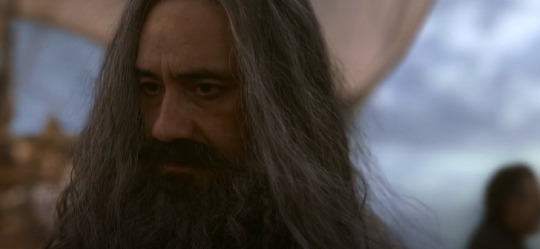
So with his crew Ed’s pretty lowkey. Quietly menacing, handsomely dignified, coldly calculating, mostly observing from the shadows. He’s discussing the “uzh” plans with Izzy in a dry and aloof manner. These people need to respect him with a tinge of fear, and getting a glimpse of his emotions other than anger is detrimental to that.
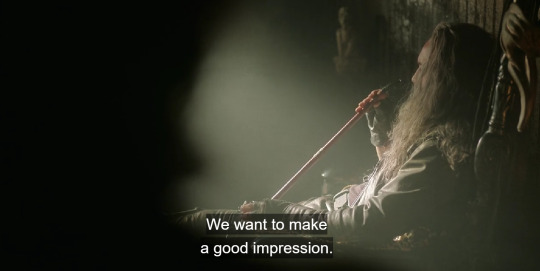
When he meets Stede, he adapts his cartoonish whimsy and sincere gentleness. He’s ready to exchange looking scary to looking affably eccentric. Stede sees something sweet and innocent in him, and so he feels uncomfortable Jack discussing maiming for fun around Stede, and tries being more sympathetically vulnerable. The “I have no friends” bit is both genuinely true, and (un)intentionally omitting anyone like Jack for the sake of the moment. The Revenge crew shyly look up to him as their friend and father the same way Stede grew to become, so he confides in them and caringly encourages them.
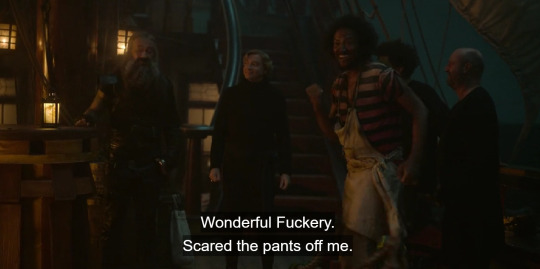
When he goes to the fancy event, he molds his casual attitude and crass humor to fit the pompous arrogant tone of the room. He readily makes jokes at Stede’s expense, as long as those people find it funny, and doesn’t think much of it. If they want him to be intriguingly scandalous and dispense all of kinds of Munchhausen stories, he can put on a hat and mock something captain-y.
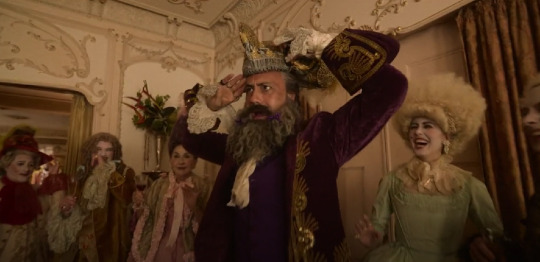
When he reunites with Jack, he’s loud, violent and obnoxious, the fifth grader state. There’s no more wit or charm or dignity going into anything anymore, all that matters is brute force and dumb fun. If he’s not bullying someone with Jack, Jack might bully him, so it’s survival of the fittest.
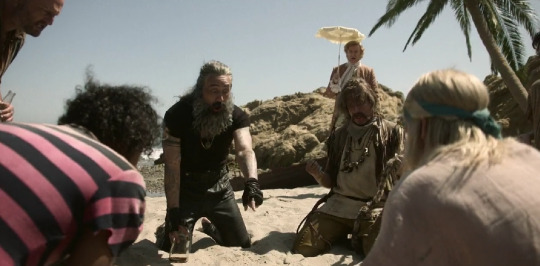
When he’s at the barracks, he’s calm and obedient. There’s no old pirate acquaintances around to shame him for this choice anymore, so he can fantasize about being Edward Teach, a civilian who always lived a mundane life and never hurt anyone. If Stede reacted positively to this change, he would’ve continued playing a soft harmless housewife. But as soon as he realizes Stede is uncomfortable with it, he goes back to plotting crazy adventures. What do you want, Stede? I can be any character from your romantic novels.
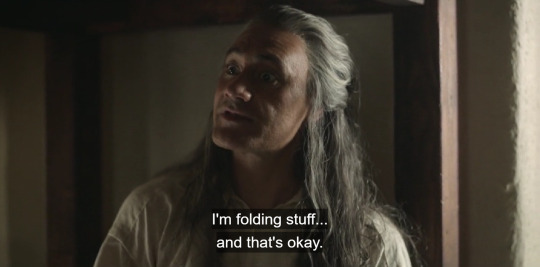
And then we have the Kraken, an exaggerated version of what he thinks Izzy wants, what he thinks people who write books about him want, what he thinks he himself needs to get over Stede.
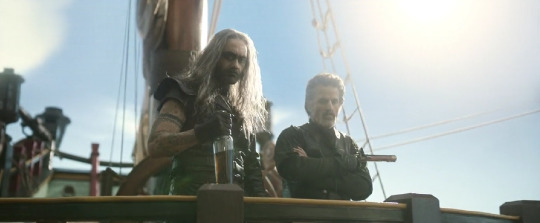
If Izzy didn’t give his speech about despising Ed’s state, and Stede never found Ed again, sooner or later Ed probably would’ve quietly returned to his regular self, the way he was at the start of the series. He would’ve discarded the robe, grew the beard back and closed himself off to the crew again. Izzy essentially causes an explosion instead of the slow fizzling out.
I don’t think we know who the real Ed is yet. I don’t think he knows, either. It wouldn’t be good for Stede to get into a relationship with a made up version of Edward, catered to his fantasies, and it wouldn’t be good for Ed to continue such performances for a crumb of validation.
They just got to the honeymoon phase, when you mostly ignore any bad things about your crush, and, in turn, attempt to look your best in their eyes. It’s very fun and sweet, but it’s easy to love someone at their best. If the relationship is to last, you need to be able to love them at their worst, as well. So I’m hoping this breakup will be a good “mask off” moment for both.
205 notes
·
View notes
Note
so i’m trying to write duke and i don’t think i’m writing him right. how would you describe his personality because with don’t trust fanon lmfaooo
(this was only supposed to be a paragraph or two i swear to god)
1. first things first, duke is a hardcore gryffindor. don’t let the yellow color scheme mislead you, okay. and while most of the time he’s depicted in fanon as “omg this family is crazy and i’m the only sane one,” it’s actually pretty much the opposite? if anything, i think the other batkids would be like “oh finally, someone who can match our level of chaotic energy. HEY DUKE WANNA BUNGEE JUMP OFF WAYNE TOWER—” and an hour later they’d all be in the batcave getting lectured by bruce for leading poor sweet innocent duke astray when really he was already planning on doing that this weekend.
listen, this is the kid who once jumped off a bridge to escape police. this is the dude who decided to fight criminals while they’re still eating their wheaties at 6am in a bright yellow suit. and while duke seems to be the best at following bruce’s command at the moment due to having been trained by him most recently compared to the others and is still figuring out how to be a hero, i’m positive that if bruce weren’t here to guide him, duke would be running around gotham taking down criminals anyway. i mean, he literally did do that with the “we are robin” kids. plus there was the whole thing when he was like ten years old and decided “i am going to singlehandedly stop the riddler in my light up sketchers and pikachu backpack. try and stop me.”
duke is headstrong and has a strong drive toward heroism. he’s an extremely enthusiastic and passionate person in general, and i try to capture a little of that when i write him, even with mundane things like trying to beat his siblings to the last cupcake.
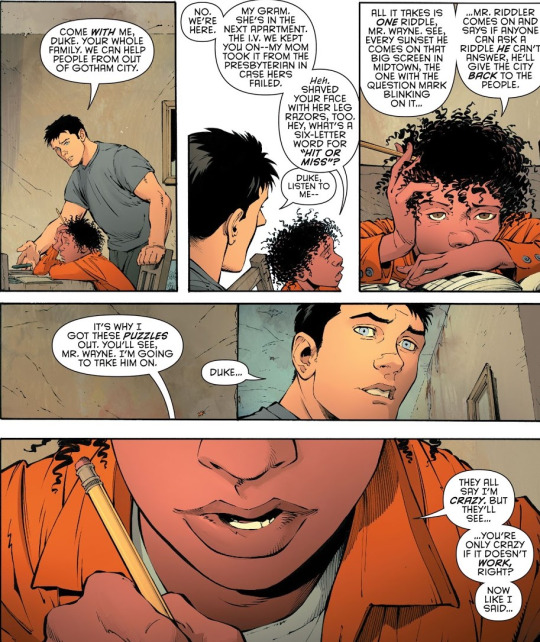
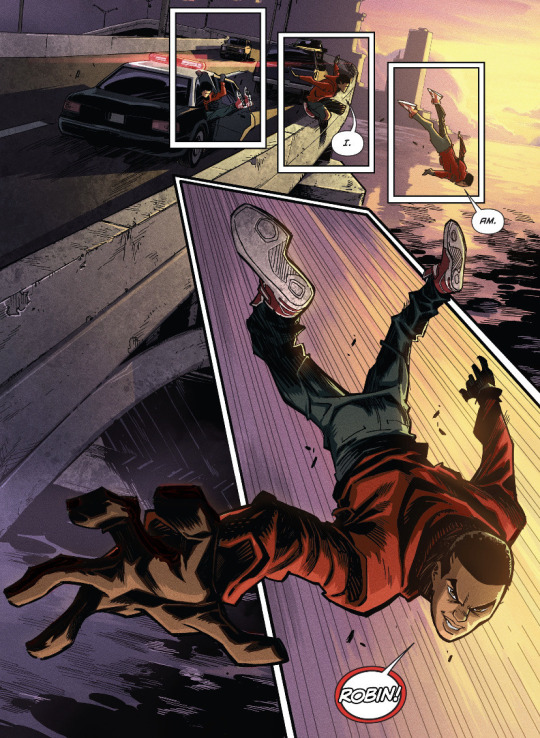
2. another thing i noticed is that duke swears like a sailor in comics? seriously, this boy could give jason a run for his money with how many “@#!%” speech bubbles there are. i don’t know if this is just a trend the writers added in the comics i’ve read of him, or if it’s a genuine trait throughout every comic he’s in, but that’s something to make note of when writing dialogue for duke. after all, he did grow up in the narrows, so it makes sense that he’d use a lot of swearing and slang in his everyday vernacular.

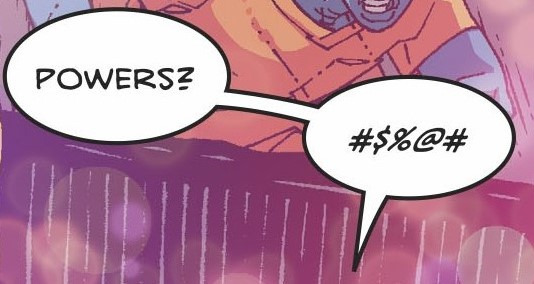
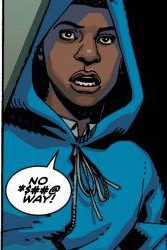
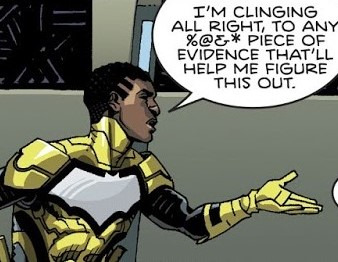
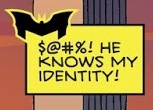
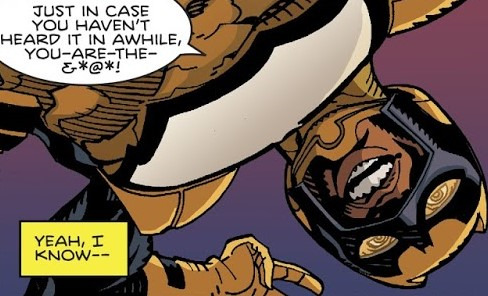
3. i would also make a point of noting that duke is fairly young compared to the rest of the batfamily, being the second youngest after damian. duke is still a teenager in high school, and he acts like it. he’s got homework and friends and is eager to make a difference in gotham, trying to juggle everything and make it all work somehow. he’s stubborn and doesn’t give up easily, so it’s important to write him as someone who is trying to save the world while also struggling with finding time to study for his next math test. he's human. he doesn’t get to dedicate all of his time to fighting crime like cass or jason might be able to, since duke is still a mostly normal teenager with teenager problems.
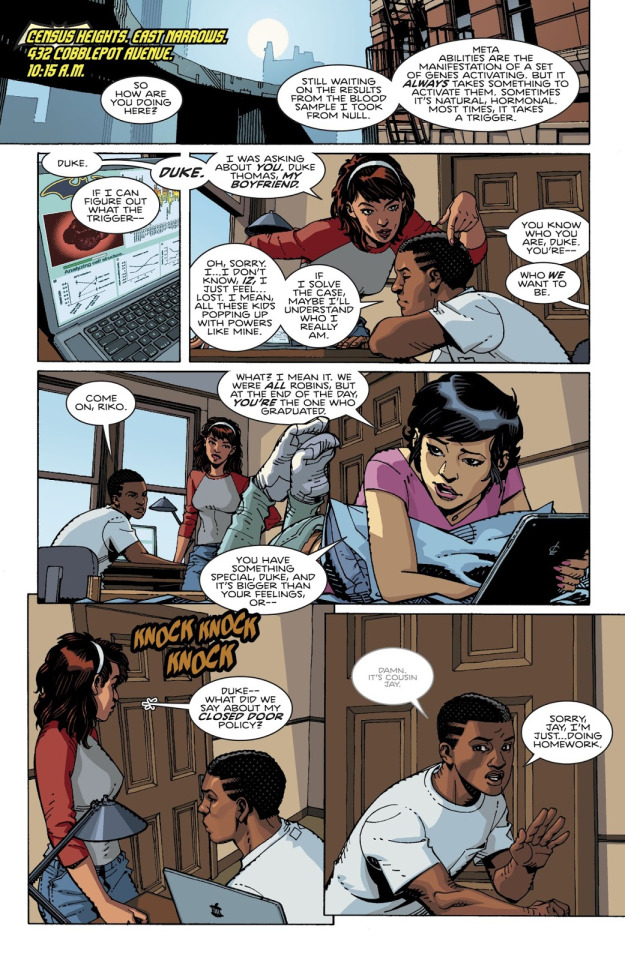
4. and don’t forget that unlike the other batkids, duke still has two living parents. sure, they’re jokerized and might not ever be the same again, but they’re alive and that’s what holds him back from letting himself get as close to the waynes as he wants to. duke won’t be calling bruce “dad” anytime soon, and i think he’d have some internal struggle over stuff like holidays and birthdays with the waynes, remembering what his parents are missing out on and wondering if joining the wayne family is a betrayal to them. duke is very conflicted over this, even if he doesn’t say it directly. stuff like ducking out of movie night early or feeling a bittersweet pang during thanksgiving dinner makes sense for someone in his situation.
(i usually ignore that aspect in my fics because i want duke to just be adopted and part of the family already, but not everyone does that, and that’s perfectly fine.)
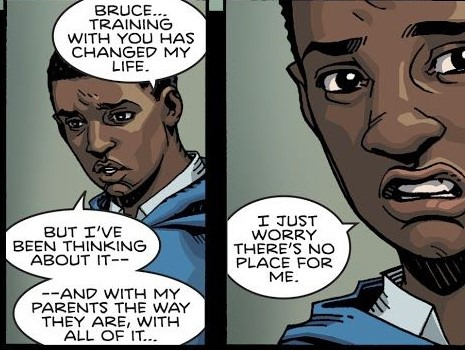
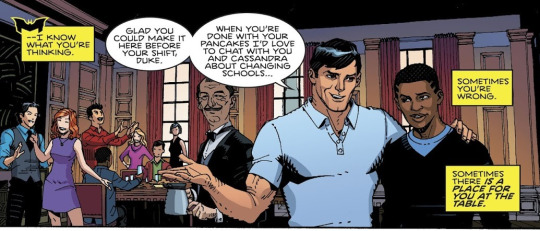
5. honestly, duke is such a caring individual and we as a fandom need more of him being a shoulder for people to lean on because he’s?? so soft?? duke can be so sympathetic and rational when it comes to emotional problems. it seems like duke internalizes every bit of advice he gets from the people around him and uses it to inspire others and help them through their own problems. as tough and hotheaded as duke can sometimes be, he really is good when it comes to emotions.
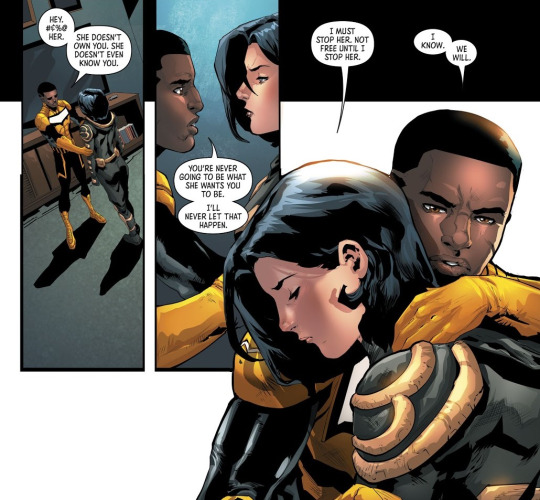
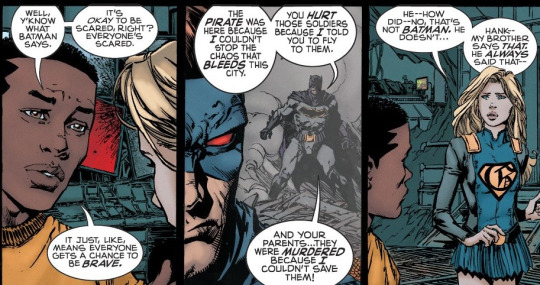
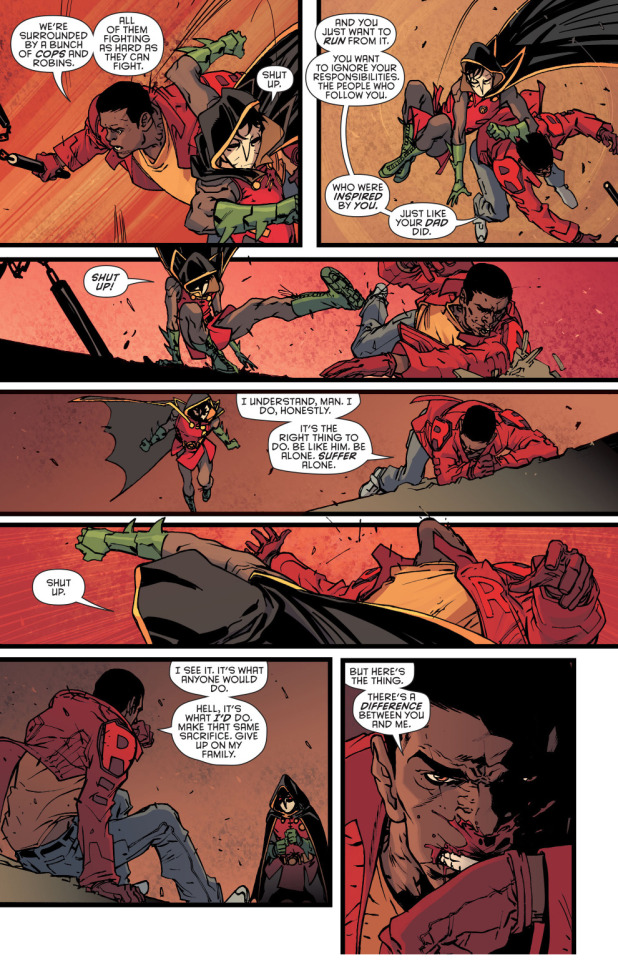
6. duke is a smartass. he will 100% use sarcasm against any and every authority figure he meets, usually just for the hell of it.
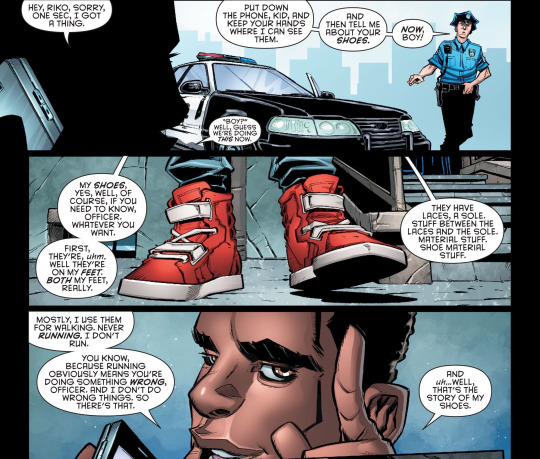
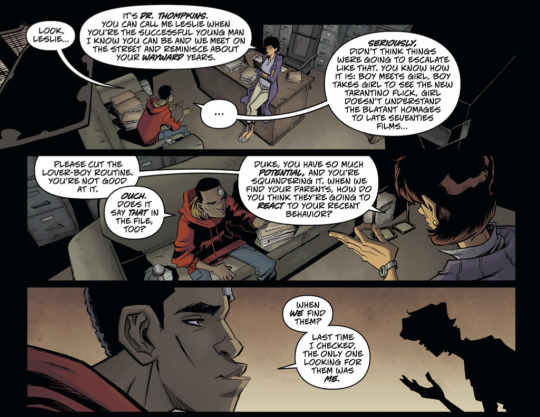
7. he’s very frank in general, usually the first to be like “okay full disclosure, we’re about to die right now. that sucks. anyway—” in a situation. he’s honest and tends to be upfront about his fears/anxieties, usually for comic relief, but i think it still counts.
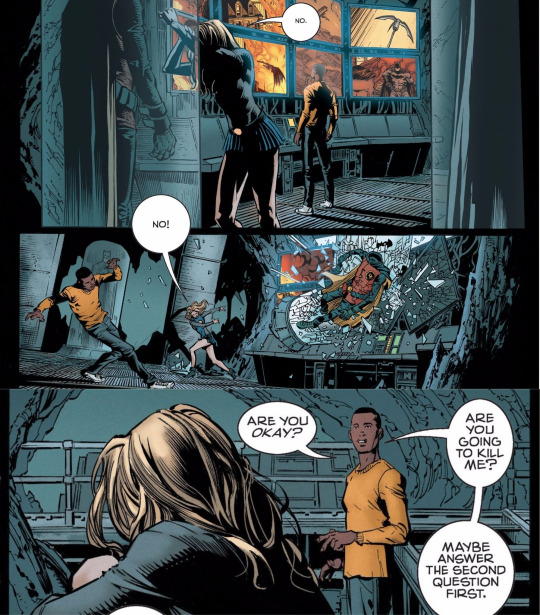

8. okay i have to add that duke is also kind of a punk? he and jason have a lot in common because of this: they both grew up in one of gotham’s worse areas (jay in crime alley and duke in the narrows) and they’re both highkey deliquents. duke has no problem getting into fights or talking back to authority figures, and it’s gotten him in hot water on more than one occasion. it’s why he kept getting moved around the foster system before bruce took him in because no one wanted to keep him.
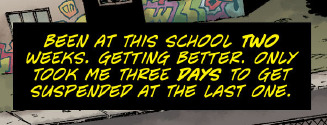
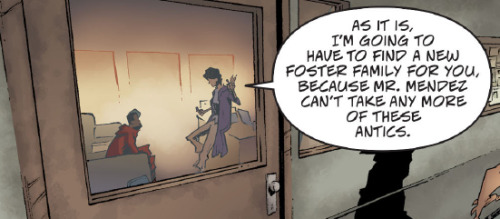
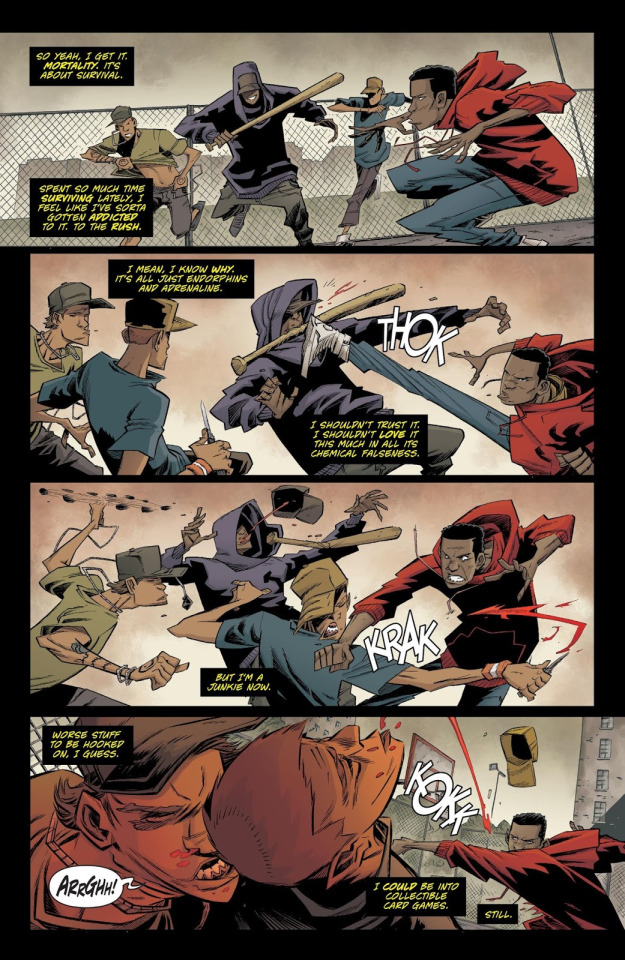
9. he’s also gotten so close with the other batkids and we love to see it!! duke calls cass “sis” and treats damian like the annoying little brother he never had and i adore every second of it. we haven’t gotten a lot of interactions between duke and the others aside from training and stuff, but he and jason have the whole “punk kid who got adopted by batman and is baffled by how rich people live” going for them, so they can bond over that. and duke is a thinker like tim, so they can hang out and do puzzles or play chess or whatever it is that smart people do. (and duke and steph are BESTIES i don’t care what anyone says.)
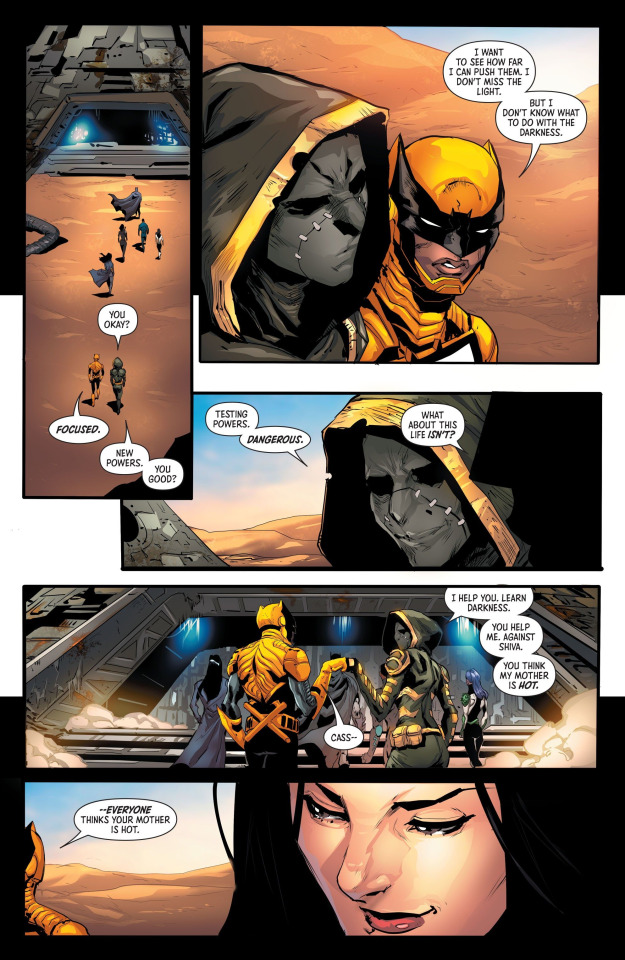
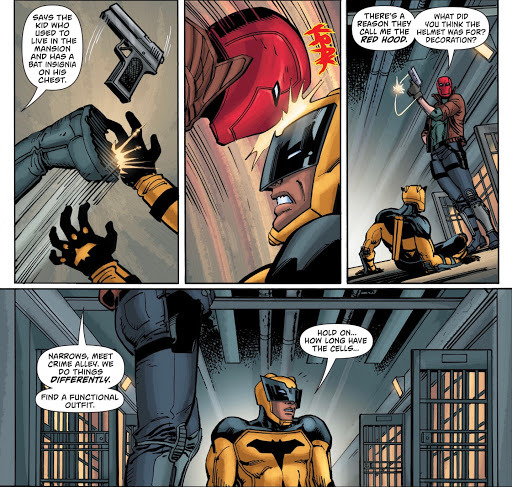
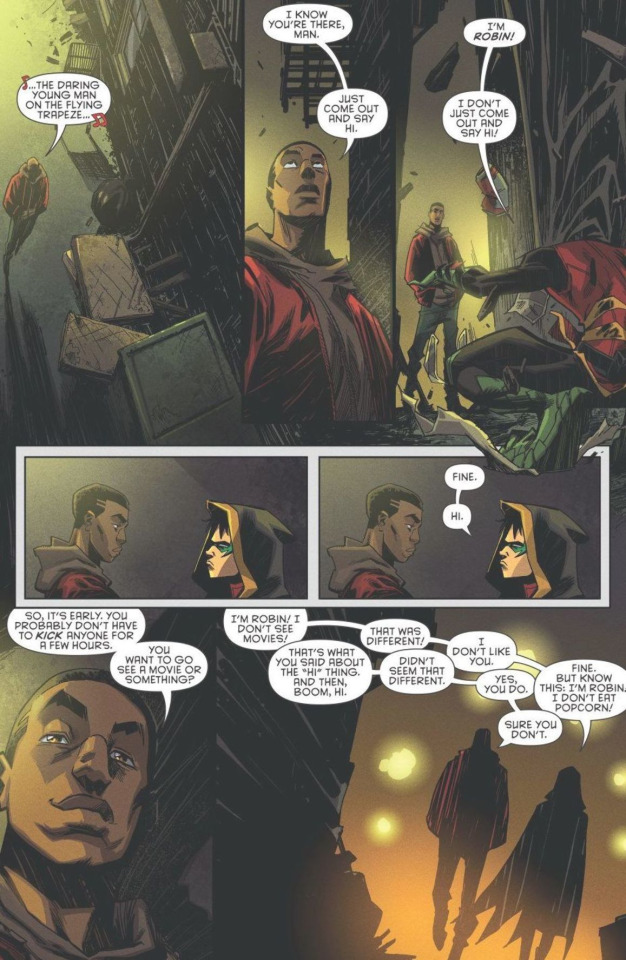
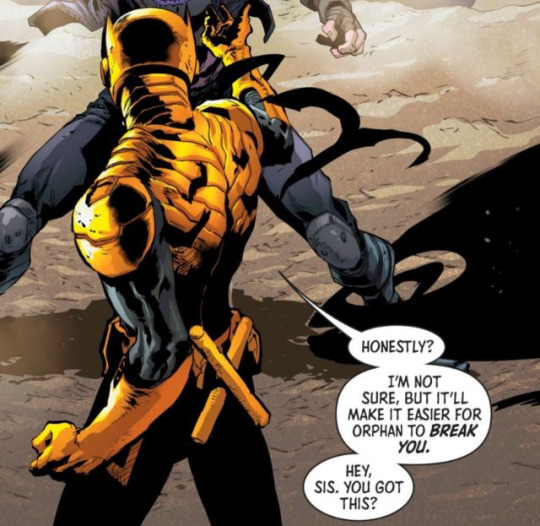
10. most of all, duke is still learning how the whole hero thing works. he’s young and he’s trying his best, but he also makes mistakes. he will be impulsive and screw up, and he’ll try and merge the lessons batman’s taught him and that his parents taught him and that other heroes teach him until it all makes sense in his own mind. duke isn’t experienced like dick or even damian, so he’s going to be lagging behind for a while until he grows until the role he’s made for himself.
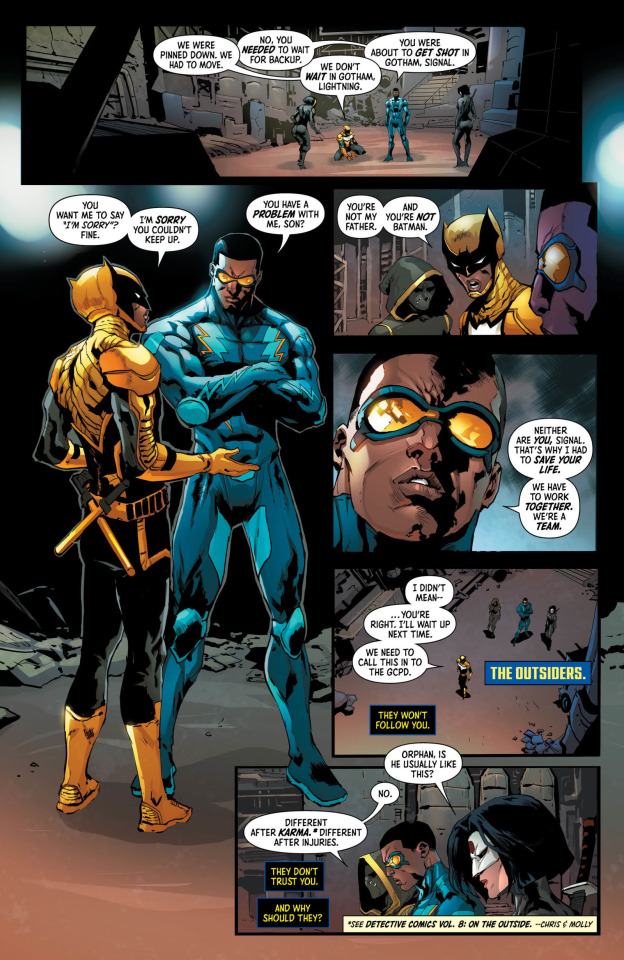
other miscellaneous details to include:
- duke is dating izzy, who used to be part of the “we are robin” gang with him - he used to live at the manor and now lives with his cousin jay, but honestly i just have him living at the manor in everything i write because i like it better that way - he can control shadows and light now! what a king! - duke secretly writes poetry and is good at creative writing in general - this:
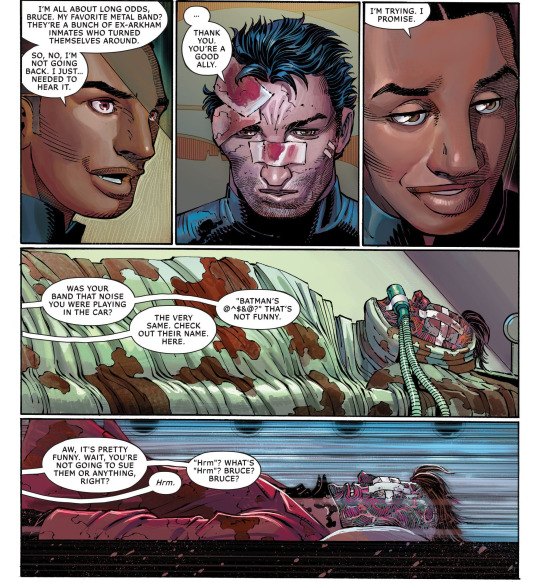
- duke is super smart?? he figured out that agent 37 was dick grayson without even trying?? i’m so proud of him - his biological father is this supervillain called gnomon so now duke has got four parents: his mom, his dad, his supervillain dad, and bruce (plus selina if you count her as the batkids’ stepmom, which i do) - jason calls him “narrows” and i love that
- and, lastly, the most important panel in the history of comics:
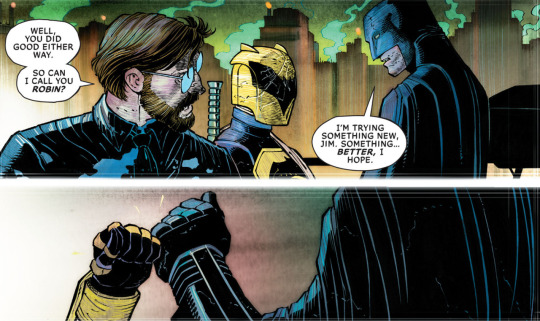
#this took so long to make#but i'm happy i did it#i love the chance to talk about my boy duke#lay it on me papa bob#batman#batfamily#batfam#duke thomas#dc signal#dc lark#we are robin#robin#batman and robin#batman and the signal#batman and the outsiders#bruce wayne#dick grayson#nightwing#jason todd#red hood#cassandra cain#black bat#orphan#tim drake#red robin#stephanie brown#spoiler#batgirl#damian wayne#dc comics
2K notes
·
View notes
Text
I see where you're coming from, and I agree - if I had my druthers, that would be what he meant; that Izzy is part of the show *in total*, and, at most, his INFLUENCE might still be felt in s3, even if the man himself is not in it. That said, the "there's no version of the show that doesn't include Izzy Hands" tweet was made on October 26th - the original air date of "Mermen", and well in advance of the cancellation notice. In that light, it reads a lot more like reassurance to me. That, while he may be dead, Izzy isn't down for the count. But. I have to admit that I also went down a pretty disturbing rabbit hole while making that reply to make sure I was recalling the "wasn't committed to the romance until after filming 1x06" thing correctly. A rabbit hole populated by DJenks interviews that I had never seen, or only seen referenced in part on someone else's posts. I don't usually seek out interviews because Word of God is not an important consideration for me when I'm evaluating a piece of media. I'm much more of a "Death of the Author" girlie, where the intentions of the author are only as good as how well they actually made it through to the text of the show, which is necessarily funneled through the additional interpretations of the various actors, directors, and editors involved in the process. As such, the opinion of any one writer, even the showrunner himself, is only really interesting to me as much as any other fan's interpretation. And boy howdy does DJenks seem to have some interesting interpretations. While he "loves all his kids equally" he's ESPECIALLY partial to Izzy; he says as much in as many words (Gizmodo Oct 9, 2023, EW.com Oct 2, 2023). He thinks Izzy "got the worst deal in the first season" (Insider, Oct 5, 2023) and is sympathetic to an extremely canyon-y sounding interpretation of Izzy's view of season 1 ("His boss is falling for this manic pixie dream girl, and he’s got to keep his boss safe because that’s his job,” Jenkins explains. “And then he has to get this ship to operate like a normal ship would operate. And they’re all weirdos. So he’s got the worst middle management position. And on top of that, his boss is a lunatic." - Gizmodo Oct 26, 2023). He thinks "Stede, Blackbeard, and Izzy are on an arc together. Whether they’re in stories together or not, their ultimate arc is together." (TV Guide, Oct 5, 2023) and that the significance of Izzy being buried in the front yard is about Ed & Stede "both thinking, ‘let’s make this work not just for us, but in memory of Izzy’." (Gizmodo, Oct 26th 2023) Izzy's big send-off was a priority around which the season was written (Tell me about what you were writing toward this season and in the season finale itself — what were your big storytelling and character-development priorities? The big thing was to give Izzy Hands a great send-off from this mortal coil. To have him become a father figure to Blackbeard, and on some level to the rest of the crew, and to see him become the heart of why we’re giving pirates the chance to stand for being able to live how you choose. - Vulture Oct 28, 2023). So. Um. Not super sanguine that I'm on the same page as DJenks when it comes to Izzy and how peacefully he is intended to be resting. On one of those interviews he also brings up that "ghosts exist" in this universe. I found a post that had curated a collection of the interviews. They're all print - no video interviews included - and there's no reference to his tweets, but it's a decent resource, so I'll try to find it again and post it for reference.
you know, I’m just gonna come out and say it. reason 182639302 why I’m sad ofmd was canceled: I would’ve liked to see a post-Izzy world.
you can stab me in the face now.
252 notes
·
View notes
Text
The Report Card – Fantasy High: The Seven Ep 6
Bitches Be Shopping
What is up y’all. A little late but let’s jump in with episode six of The Seven where our girls have just received a LOT of information, Sam most of all who got put into a little vision coma that she’s just now waking up from.
She explains the vision to her friends (as she interprets it, the other Eidolons didn’t die, just became part of the natural forces of the world) and then the bear that Penny made on a whim last episode (who is Russian, named Koda, and somehow a trained circus bear) gets into a fight with Katja with their friends buffing the two to make things more interesting because these are still idiot teens, life or death situation or no. Yelle decides to be the adult and tells them to knock it off and get back on mission.
That means Katja needs to call her dad since he’s knows the guy who’s the best lead to getting to TK ( Talcidimir Tallbreeze who I’ll call Tal). She actually manages to get her dad this time who is inside a giant snake on his hell mission. Katja asks what he knows about TK and he says she’s a sorcerer but also has a spell book so maybe she’s multiclassed. Sam and Ant desperately want to know if they boned and Katja absolutely is not interested in that knowledge. Yelle decides to just ask which makes her dad a little annoyed since he’s kind of in the middle of something (literally) and that annoys Ant, Ost, and Sam who--respectively, accuse him of gaslighting Kat, cast Command on him, and cast Bane on him to aid the Command spell.
Mr. Cleaver fails the save and Ost commands him to tell Katja the truth. He admits that he did hook up with TK and he regrets it (note: it wasn’t like he cheated. It was just a casual hookup that wasn’t fulfilling it seems). Ost demands he apologize for not being there for Kat and Sam berates him for being at the top of the world and not lifting up his daughter too. For his part, Kat’s dad seems genuinely apologetic and promises to do better.
“You don’t need to be the best father, you just need to be there,” Katja says, making her dad break down crying.
Yelle, who has no daddy issues, is a bit less aggro and says that everyone makes mistakes and he can start making it up right now by helping with the Tal situation. She also gives them the tip that a cold spell will probably get them out of the snake lickety split. She is on the money with the snake tip and Mr. Cleaver gets them all invites to a masquerade ball Tal is hosting. It’s being held on the Rumbosa which is this city-sized leisure ship. Mr. Cleaver says he’ll be back as soon as he can and, in the meantime, she should take care of her friends, “even the first 2 that were terrifying to me.”
The girls give Katja the axe they took as a birthday present (it was apparently her birthday the day before which Rekha just decided and Ost/Izzy refuses to accept without a fight because she *knows* Kat’s bday) which is identified as the Axe of Sundering (it can shatter objects, people, and sometimes concepts like halving movement). The two unnamed potions Yelle found are also ID’d as a Potion of Fly and a Potion of Gaseous Form. She distributes the Heath Potions to people without heals. Ant’s new arrows bypass some resistances and let her treat whatever she hits with the first one like it’s her favored enemy.
According to their invites, the ship they need is docking in the city of Gravalvia soon (a very old city in the Baronies) so they need to figure out a plan. They have some downtime, during which:
Zelda tries to hype up the team.
Zelda tries to see if Ost is OK wrt dad stuff and Ost has a Full Breakdown after badly pretending she’s fine.
While Zelda, Ost, and Penny are being Emotional and Sam is trying to literally cool them down with her powers, Ant and Yelle keep watch and experience emotional stability as the Adults Of The Party
Anyway, after a night of rest, they head to the golden city of Gravalvia which is this very cool, very pretty city with mosaics and fountains and I assume columns. They get there and there’s a dramatic fight happening in the square which is halted when one of the fighters realizes that the country he’s fighting for doesn’t exist anymore. And now, it’s time for what we’ve all been waiting for. Shopping Montage! Let’s go girl by girl.
Katja and Ost
Kat asks for help from Ost with getting fancy for this gala since she’s never really done anything dressy before (and she had no mom to help--Kaaaat) and Ost is happy to oblige, dressing them both like “Jersey trash”. Kat, of course, still wears her Khakis underneath.
Antiope
Ant decides to get a vibe for what people here wear and picks something that will blend in but be forgettable so she can be stealthy. Classy blue dress and mask.
Penny
Penny...OK, I absolutely cannot describe what happens here in any way that will do justice to the scene. I am going to tell you what matters to the plot. You have to watch this yourself if you want to see the entire table have a collective breakdown.
While looking for a costume, Penny runs into a halfling who is a member of the Society of Shadows--Laertes. He wants to know why she hasn’t responded to their invitation yet. She says she’s really eager to join, she just wasn’t sure how to respond (and also, she’s kind of in the middle of something). He says she can join by just messaging back and then her loved ones just have to sign waivers to have their memories wiped of her and she’s good to go. Say what now? asks Penny. She didn’t realize this was like a full Men in Black situation.
He says it’s ultimately her decision and leaves.
Of course, I left out the parts where he ate a handful of Candy Heart’s remains, became violently ill, almost projectile vomited into Penny’s mouth, and she tried to kiss him despite him being a full adult. It’s A Lot, ok?
Also, we don’t find out until later but Penny picks a sexy duck costume for reasons that make more sense if you watch the scene but not *much* more sense. She also burns one of the healing potions on this dude as he is bar
Danielle
Danielle tries to get some info on the guests at the party and gets the names Lawrence LaDuc, Princess Autumn, and Duston who is the playboy cousin of Tal. She also hears some dude saying some colonize and plunder the earth BS and casts Heat Metal on him, fully mercing the dude. Ice cold.
She tries to play it off like it’s the Curse of the Forest and when that doesn’t work and people start coming for her, she wildshapes into a dragon wyrmling and starts roasting people, killing 1 and dropping 2 to zero.
Unfortunately, one of her party members is a known dragon hater and uses her new arrows to snipe her right out of the sky. Ant is horrified once she realizes what she’s done but Yelle says it’s all good. It’s NOT all good, says Ant, I STABBED YOU. You’re allowed to be mad! Yelle says she’s just really good at compartmentalizing but what Ant’s getting here is that Yelle doesn’t really believe that her feelings matter which echo the fears of her moms.
Sam
Sam uses a combination of Mantle of Inspiration, glamour magic, performance, and good old flirting to get herself some killer clothes and also start a spontaneous musical number Giselle style.
Brennan says she looks resplendent and, honestly, when does she not?
They reconvene, Zelda in a classic hoop skirt. Yelle realizes she never got a costume and just whips out a Met Gala level, autumn themed, Queen Mab-esque costume with Druidcraft which she could have done this whole time so I guess that’s why she was cool spending her shopping time getting gossip and playing Poison Ivy.
They get to the ship and the way this works, everyone has to make an entrance and the really rich people (including Tal) are on a dais up top watching everyone come in. They all have to give fake names for the night since it’s a masquerade and they have to do Performance or Persuasion checks to see how impressive they look going in.
Before they go in, they plan a little. Penny wants to look for TK. Sam wants to find Dunston. Ost wants to talk to the bouncers. Yelle wants to see if there are plants she can manipulate (there are btw) and for any exits.
A quick rundown of how these all go:
Katja aka Mere (which means both mom and horse): 16
Ant aka Midnight Huntress: 18
Penny aka Penny Duckstone: 13
Zelda aka Madame Goodparty: 2 (Poor Zelda)
Sam aka Songbird: 22 (but she takes a hit to entrance save Zelda from totally flaming out)
Ost aka Stanley Gucci: 13
And Danielle, who never hogs the spotlight and is embarrassed to admit that maybe she does want to be the center of attention for once in her life with a Natural 20, gets a 29, absolutely bringing down the house as Empress Anima. As she walks forward she feels a voice say to her, “You got this. I love the name. You wear it well.”
Tal seems very impressed by her and a lady in a rabbit mask (Coeliabranca who I’ll call Coel if she comes up more) comes down to bring her up to the top with the high rollers. As she leaves, Sam casts Fly on her, just in case and holds the Concentration.
Ost and Kat go talk to the bouncers and Kat decides to pretend to be her mom to get access to the area Yelle is. She rolls low and is told, “Hey, aren’t you already up there?” Kat is like, fuck and Ost saves her by using her charm earrings to get an entourage of guards who will let them through and do what she says. Once up there, Kat doesn’t see her mom which I can imagine she has mixed feelings about.
Sam finds Dunston who is talking about Fantasy Bitcoin and seems like a real “Step on me mommy” type you know? Like, I feel like he’s into findom. Anyway, Sam charms him and his hangers on and learns about a procedure called a Phlebectomy that involves something going into their nose and then they feel better. Sam is rightfully horrified because, as I said, she is Most Likely To Survive A Horror Movie and can sense BS when she sees is. It’s apparently all the rage with the rich people here which is, como de dice, concerning seeing as they’re surrounded by them but we’ll get to that. Sam takes advantage of Dunston’s proclivities and gets him alone, knocks him out, steals him clothes, and pretends to be him (a *very* good scene by Sephie).
Penny sees a gnome gnome boy (Lysander Higgins) shining shoes and finds out from him that there is a copper earth genasi woman here. In a very Cinderella move, she asks what shoes she was wearing. Then, she makes out with him which like, sure. At least it’s not a grown adult man this time. Before she gets her kisses in, she does tell the group what she learned.
Up with the rich people, Yelle is introduced to Tal’s friend who is into Eidolons because of the name she chose. Between the shoes and her knowledge, they confirm that it’s TK! Yelle asks what she knows about Eidolons and she says that 7 is a very powerful number.
We cut to Ant who is patrolling the room as the sun sets and she suddenly hears a little beeping. It’s coming from a small crystal that was in Preston’s shirt (which she still has on her because???). Guests start dripping goo from their noses and transforming into monsters. Ant realizes that some kind of spell is happening triggered by midnight and this beeping. Hope these costumes are battle ready cause it’s fight time baybee!
Superlatives
Danielle: Most Likely to Be on The News for Murdering Fantasy Jeff Bezos
I cannot imagine what was running through Yelle’s head when she decided that, having just rolled into a foreign country, her next move was to start using lethal force on anti-environmentalist colonizing capitalists. Like, she’s not *wrong* per se but she is wild--in all senses of the word.
Random Thoughts
Kat keeps saying yesterday was her birthday which Ost/Izzy (and the rest of the group to a less vocal degree) are simply not having because maybe her dad would forget her birthday but her girls absolutely would not.
“You’re great because you stayed,” is the other killshot Kat line to her dad.
At a certain point Sam says, “This is so unhealthy,” to I think Yelle and like, if SAM is telling you your coping mechanisms are unhealthy, get thee to therapy.
OK, so someone, presumably Anima’s spirit, talks to Yelle as she makes her grand entrance which seems like info they should get to Talura ASAP, right? Cause that’s evidence they’re not dead-dead, just changed in form. But also Anima, girl. Don’t talk to Yelle. Talk to your rampaging sister!
"That's my secret, I stay in initiative."
Just a process note, notes are taken for the next ep and I am working on getting that recap up ASAP. As a battle ep, it will be in the abbreviated style that I did for last battle ep.
In this episode, Penny rolls a Nat 1 (which she rerolls) and one of Brennan’s NPCs rolls a Nat 1. Ant rolls 2 Nat 20s, Yelle rolls 1, and Brennan says that one of his NPCs gets a 20 which sweeps him entirely into Sam’s dance number.
20 notes
·
View notes